How to understand Mitu and feminist movement in China as a liberal
At the end of last year, Chen Chun and I were invited by a friend to share with the Chinese pan-liberal community in the United States. I remember that Zoom was full that day, and many colleagues from the liberal and feminist communities came to listen. Everyone had a sincere discussion comminicate. Although for me, these contents are clichés that have been repeated many times, I am pleasantly surprised that the audience still feels that they have learned something new.
It's a pity that my mental state deteriorated later, and it didn't get better until this spring and summer, and it was only recently that I finally sorted out the manuscript. I hope my narration can help more people who are curious about this topic.
Hello everyone, it is a great honor to be able to attend this lecture. Let me first make a brief self-introduction.
My pen name is Mimiana, I am a writer and I also work in the media. I have long been concerned about civil struggles in China, especially the feminist movement, and I have also participated in some feminist actions, but I mainly like to observe and discuss. You can find them in Matters See some of my articles here.
On the political spectrum, I am both a liberal and a feminist. These are not just the labels I put on myself, but the life experience I have come to understand, feel, and practice along the way, so I am very I can feel the fit and tension between the liberal part of myself and the feminist part. Today is to share my journey with you, hoping to inspire more discussions.
Before starting, in order to avoid misunderstanding, I would like to define the liberalism referred to below. I mainly refer to conservative liberalism, that is, the group generally known as "public knowledge" in China (some ideas held by it), This is different from the so-called "progressive liberalism". The latter mainly refers to the left-wing liberalism influenced by European and American (even international) liberalism, including gender, class, race, social construction and other knowledge. The former and the latter There is a big difference between them, and it is necessary to understand their differences in order to understand the tension between the two in Mitu Sports.
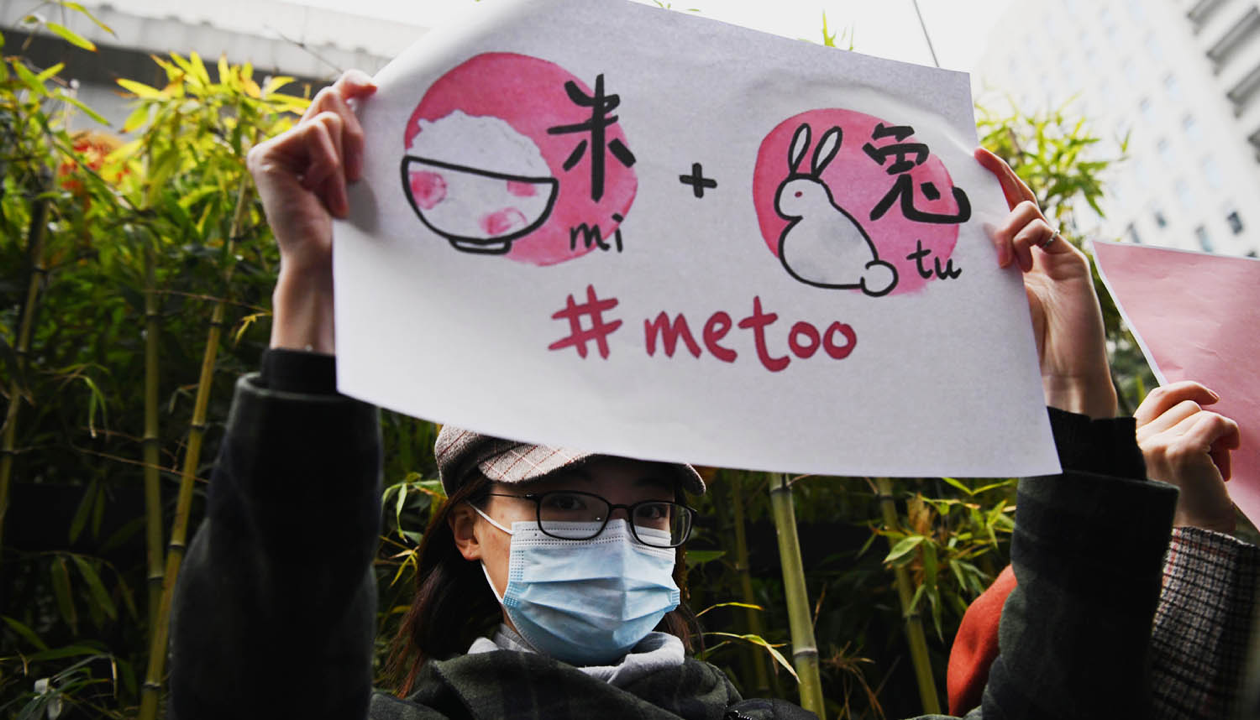
First of all, why are we discussing this topic today?
The first is that the domestic feminist movement has entered a difficult period. You may be more and more confused about some of the obvious feminist voices on social media. For example, its focus has become very narrow, the community is becoming more and more closed, "extreme", "out of reality", "irrational" "…This prompted me to think beyond my identity and circle. At this time, liberalism can serve as a mirror to help us understand the plight of the feminist movement and restore the publicity of the feminist movement.
Also, I wanted to find more connections under the growing iron fist. In the process of totalitarianism in China, the actions of liberals were completely suppressed, and they could hardly promote the process of social improvement. Now feminism is also under attack. We are facing the elephant in the same room. But in the process, we have some controversies about social justice that have not been fully discussed and have not reached a consensus, which prevents citizen groups from learning and supporting each other. This is what I want to try to break through.
Thirdly, the organizer found out my original intention of doing this lecture. In his words: "remedial lessons for public intellectuals." I think many liberals really need remedial lessons. Their knowledge structure, especially when it comes to women's rights, sexual minorities, etc. The cognition of disadvantaged groups lags behind the international liberal groups. When I was preparing this lecture, the famous tennis player Peng Shuai accused Zhang Gaoli of sexual coercion, and women came forward to talk about the power violations they encountered, but some public officials still focused on "this is a big game of high-level power struggle". Chess'" narrative. It can be seen from this that in the long-term confrontation between "public knowledge" and public power, women have always been regarded as tools of struggle. Victims lack the subjectivity of human beings, and the violations they suffer are never taken seriously, which has great ethical problems and is anti-liberal in nature. Feminism complements the missing gender dimension of liberalism, bringing the rights of half of humanity into liberal considerations. Therefore, for those who don't understand, or still judge the feminist movement from some superficial labels, this is a necessary supplementary lesson.
Today I want to share a lot of content, but time is limited. I have selected the key points and simplified them into three parts, namely: the early stage - the origin of contemporary feminist movement and liberalism. The climax—the differences between Mitu and the liberals, and the later stage—the status quo of the feminist movement.
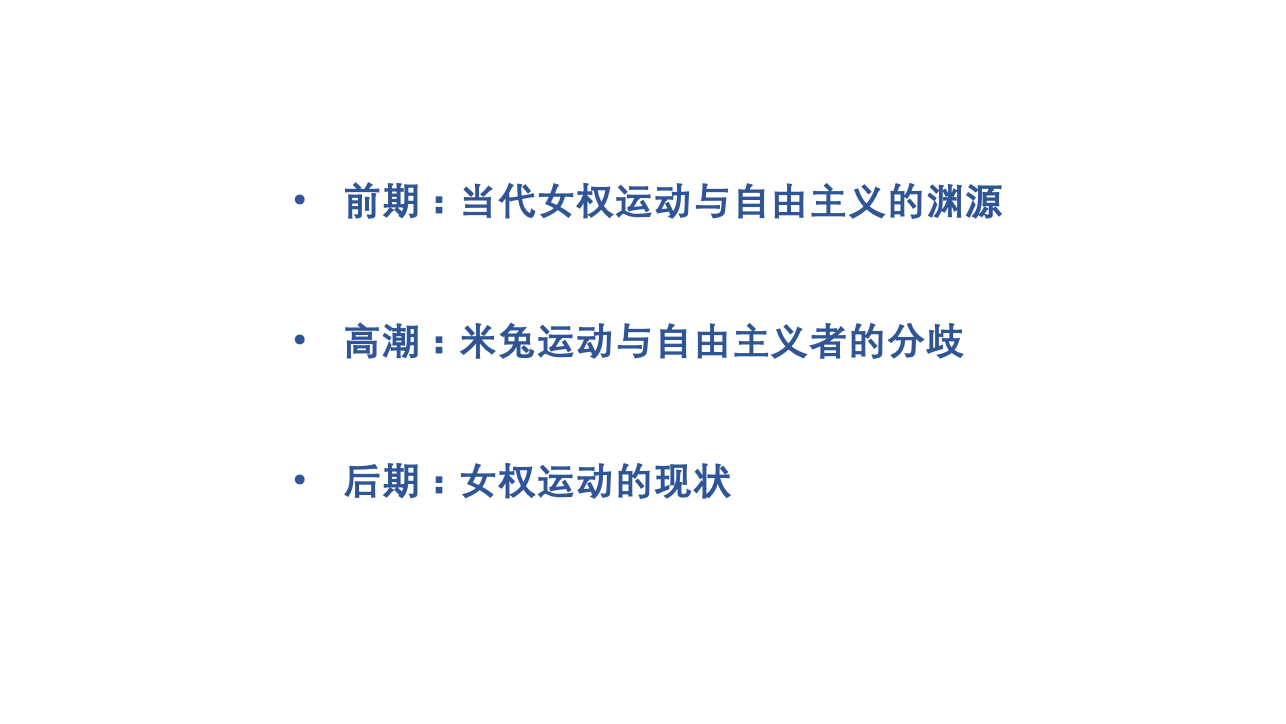
In this context, you will find that the interaction between liberalism and the feminist movement is very interesting and interesting. I try to make a relatively systematic sorting out, and I also want to provide you with a context (context) and some events for reference. Otherwise, if we just discuss the relationship between liberalism and feminism out of thin air, it is easy to go far.
First of all, I would like to quote a popular quote in feminist circles as the opening:
"Attitudes toward gender issues can test whether a person is a true liberal."
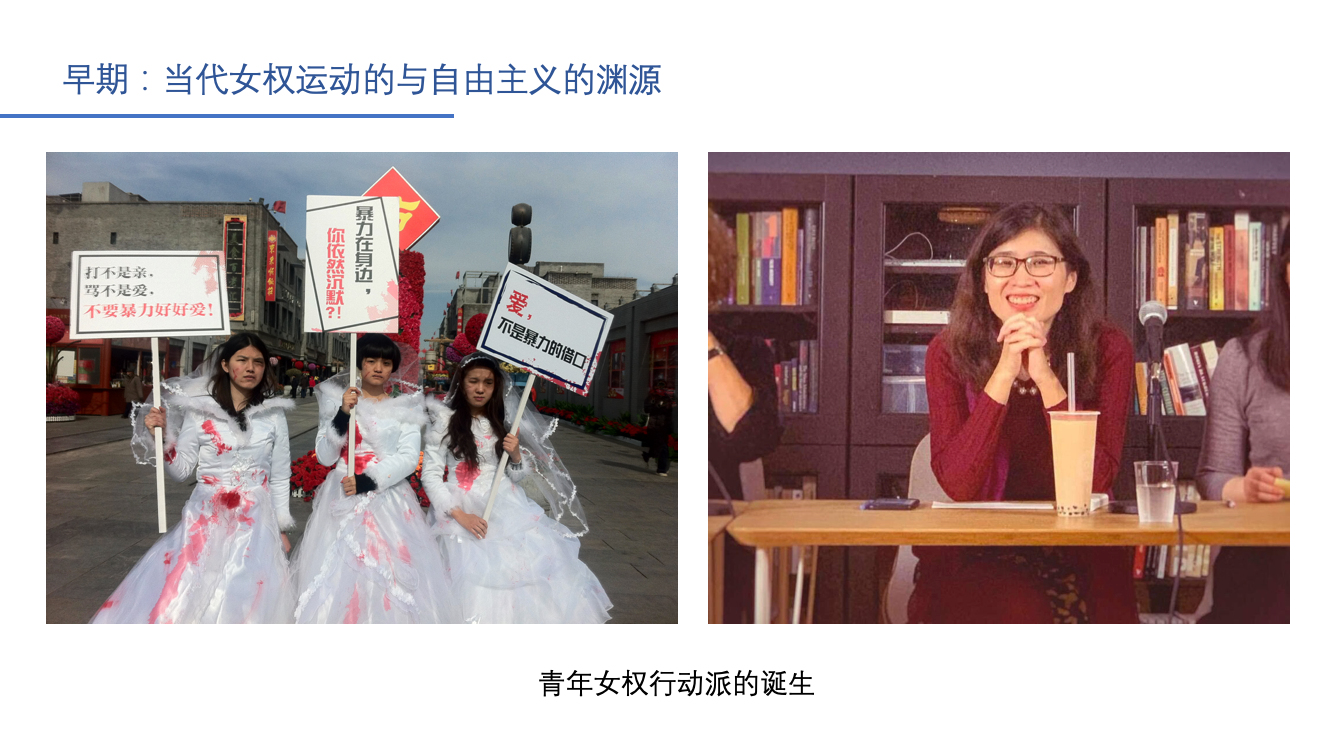
When it comes to the origins of the feminist movement and liberalism, one cannot fail to mention the young feminist activists and Lu Pin, the leader of the feminist activists. Of course, they are not the only ones involved in the feminist movement. Feminist intellectuals such as Ai Xiaoming, who are actively involved in public affairs, and Ye Haiyan, a grassroots activist who focuses on defending the rights of sex workers, are prominent figures in the feminist movement. The focus on feminist activists today is largely because they are an organized group of citizens.
What is Youth Feminist Activism? Probably since 2012, a group of young feminist activists emerged in Chinese society. They were often college students, and many of them had NGO backgrounds. Friends in the feminist community should be very familiar with these faces. They are characterized by being very good at mobilizing the media and connecting the public. They will take the initiative to intervene in hot current events, use performance art to attract attention in public places, actively hold accountable for gender discrimination in government agencies and enterprises, and openly advocate gender equality; In the way advocated by the government and high-level enterprises, we strive for equal social resources and civil rights for women.
Why does this history of feminism and liberalism start with feminists? Because after China's reform and opening up, especially after the market economy developed in the 1990s, along with economic liberalization, cultural liberalization and political liberalization also followed. Unlike the previous Marxist women’s liberation movement that existed within the system and was closely integrated with the national agenda, this wave of liberal feminist movement emerged from the background of the development of Chinese liberalism at that time. Feminist activists, as the most visible representative of the liberal feminist movement, can be said to have promoted the feminist movement from within the system to the people. So I think this is the starting point of the civil society feminist movement.
In addition, from their ideas and actions, we can see the distinct characteristics of a civil movement. Many of the initial participants of feminist activism were young people associated with NGOs, and their actions often echoed and linked with a wide range of social elites (such as media workers, lawyers, scholars, etc.), and they had clear demands and agendas , and take organized action. Unlike feminists in the system, such as college teachers and women's federation cadres, they clearly regard the state as the object of accountability, and many of their appeals are system improvements.
It is worth noting that the time when they started to act was 2011-2012, which was at the later stage of active civil society in China. From about 2008 (commonly known as the first year of civil society) until around 2014 when social activities were tightened, the period of five or six years, I think, is a short window period for Chinese civil society. This liberal feminist movement emerged along with this rising civil society.
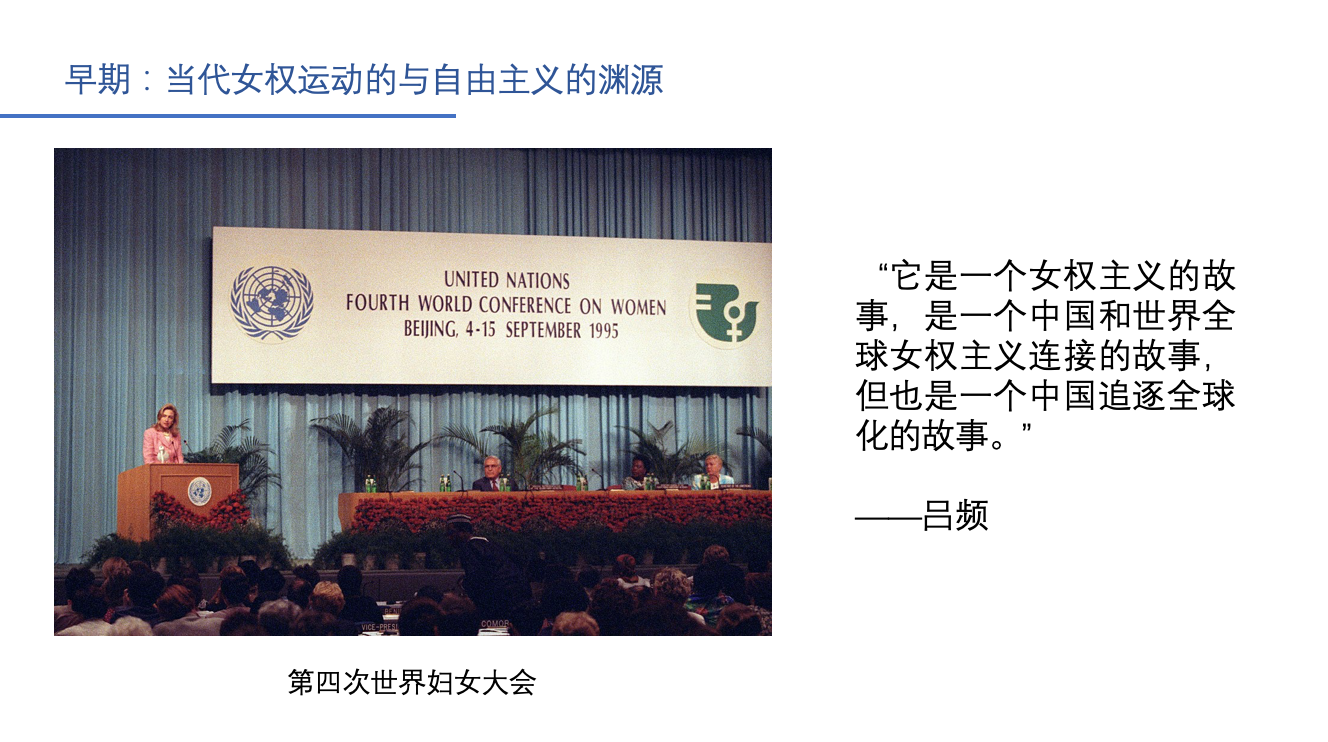
I would like to explain the background of the rise of liberalism (including liberal feminism) in China at that time.
The opportunity for the birth of young Chinese feminist activists may be traced back to 1995, when the Fourth World Conference on Women was held in Beijing. Regarding this far-reaching conference, Lu Pin commented: "It is a feminist story, a story of the connection between China and the world's global feminism, but it is also a story of China's pursuit of globalization."
The 1995 World Women's Conference not only inspired the feminist movement in China, but also had a profound impact on the entire civil society in China. Because after China restarted reform and opening up in the 1990s (marked by Deng Xiaoping’s southern tour), China urgently needed to be accepted by the world, and needed funds, technology and talents to develop its economy; and after the disintegration of the Soviet Union in 1991, Western societies also hoped The agenda of promoting democracy within the scope of the Chinese Communist Party, and later saw the interests of China as a huge market. In this historic "two-way journey", the holding of the World Women's Conference is an important action for China to connect with the world, and it is also an important enlightenment for Chinese civil society. Hillary's speech "Women's rights are human rights" resounded all over the world. It can be said that only then did Chinese people have the concept of "civil society".
According to the descriptions of some seniors who participated in the conference, many foreign NGO women workers participated in the conference at that time, which was undoubtedly an eye-opener for many (potential) feminists in China. The World Women's Conference also gave birth to the first wave of non-governmental women's organizations.
At that time, Lu Pin, who was working for the "China Women's Daily" in Beijing, also participated in the report of the Fourth World Conference on Women. According to her own description in "Twenty Years of Witnessing Women's Rights in China" , as a reporter, she was always marginalized in the feminist movement within the system, and she had a lot of confusion and dissatisfaction in the process of participating in activities within the system— The movement is limited to a dialogue within an elite circle, and it is too academic. It does not connect the public, nor does it give young people a dominant position. In the space of public discussion that was rapidly opened in China at that time, there were no feminist voices. Therefore, dissatisfaction with feminist practices within the system prompted her to step out of the system and bring feminism to society—a qualitative change.
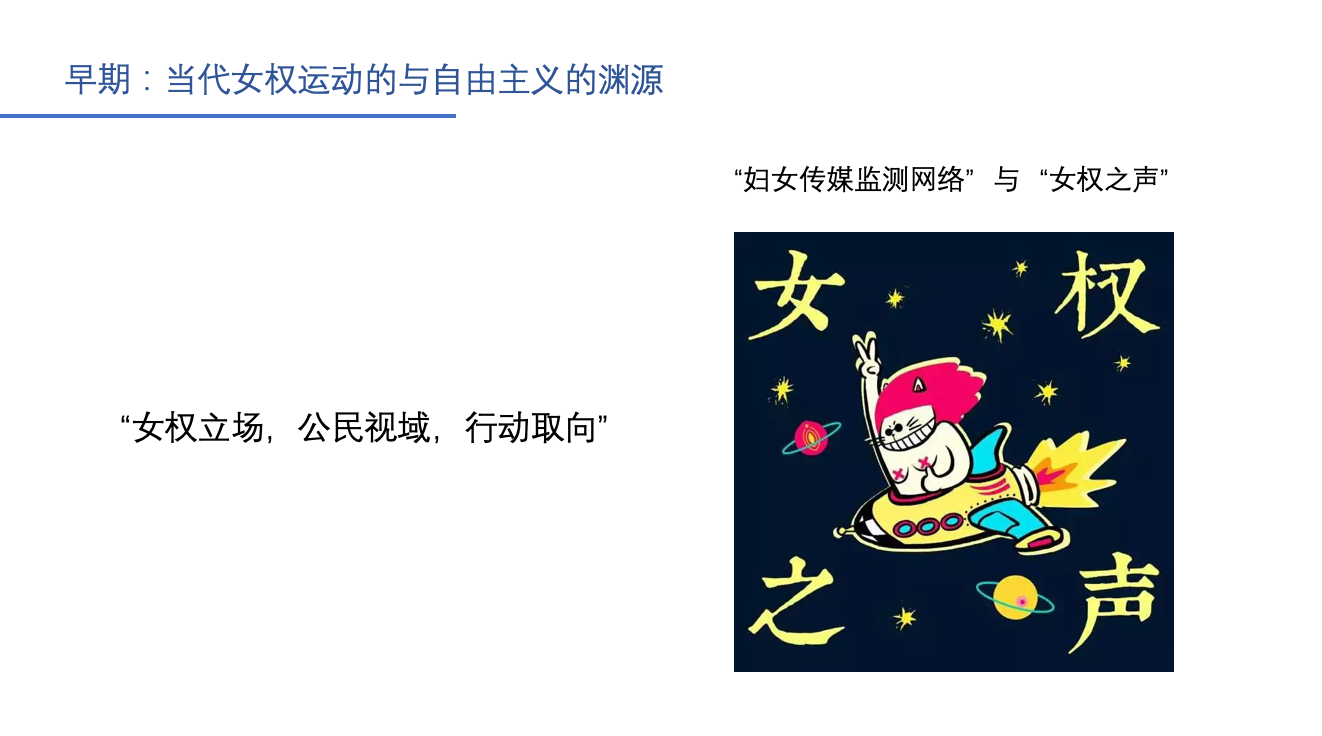
In the second year after the World Women's Conference, Lu Pin founded a feminist media organization called "Women's Media Monitoring Network". In 2004, Lu Pin resigned from the newspaper and became a freelancer. In 2009, she founded the electronic newspaper "Voice of Women" under the banner of "Women's Media Monitoring Network". "Feminist position, civic vision, action orientation" - you will find that this is the orientation of all practices of feminist voices and feminist activists.
Until March 9, 2018, when "Voice of Women's Rights" was banned from the entire Internet, it was the most influential platform for disseminating and advocating women's rights in China, providing important support and guidance for Chinese folk feminist activities.

In addition, the folk activity center "One Yuan Commune" established by Lu Pin and some NGO workers in 2011 is dedicated to civil society ideological enlightenment and social mobilization. Various feminist activities are held here and are open to everyone. had a positive social impact. Many young people (mostly women, mainly female college students) were enlightened and changed in the various feminist activities held by the "Yuan Commune". This is the beginning of the "Youth Feminist Action Group" entering feminism.
As Lu Pin said, "Young people have energy that has not been absorbed by the system, energy that has not been absorbed by family and career, they are the real supporters and participants of social change, and they are reliable or sustainable supporters and supporters. Participants." She led ordinary young people who have been marginalized by the system for a long time into the door of public participation; and organizing the "Feminist Action Group" is also a process of participating in the construction of civil society. Lu Pin realized that the feminist movement is not enough to only have a platform to spread, and it also needs an action organization in order to better promote social change.
Therefore, Feminist Voices serves as a platform for dissemination and publicity, while the Young Feminist Action Group serves as an organization for on-the-ground action. The two are actually complementary and indispensable, so they can form a wide range of influence.
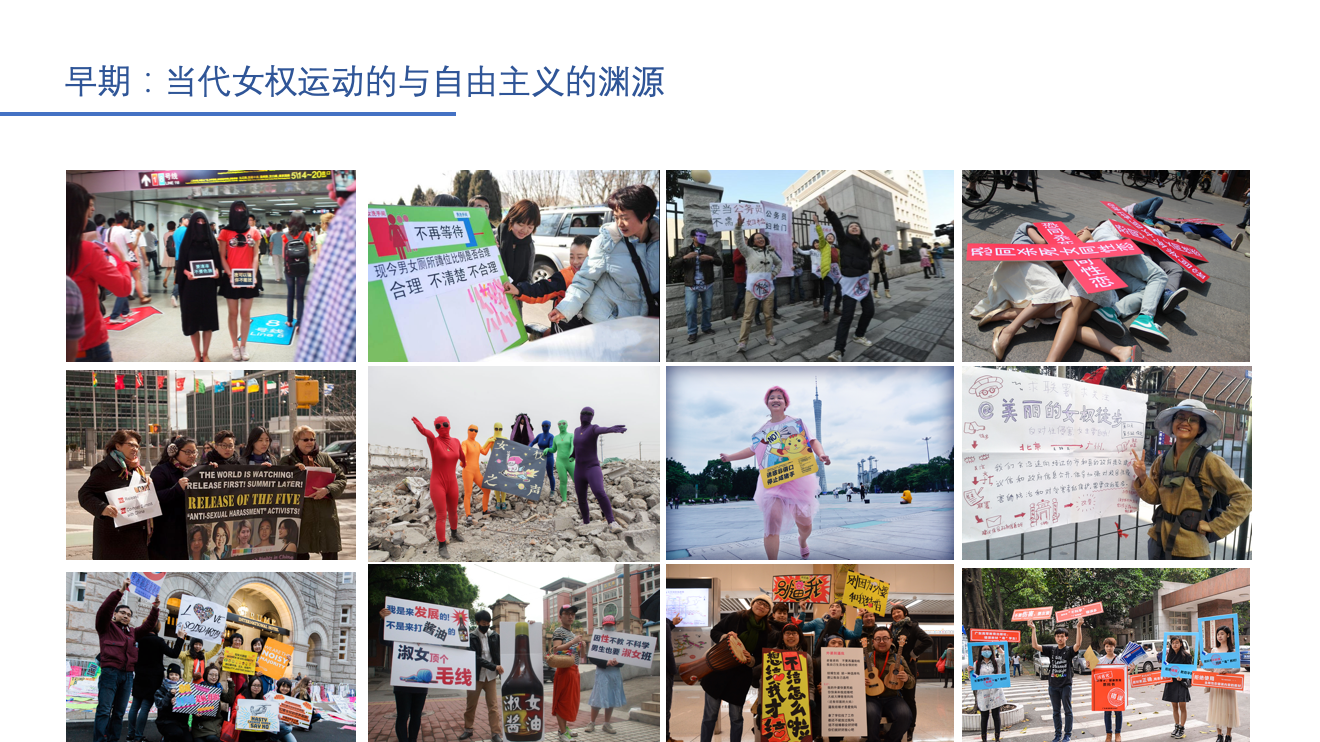
Feminist activists have carried out many street actions and policy advocacy. From 2012 when they became active until now, according to my rough statistics, the activists have launched nearly 50 influential actions. If you are interested, you can refer to the "A Brief History of the Chinese Youth Feminist Movement ( Part 1 and Part 2 )" written by me. You can see that many mainstream media had reported on them at that time, or I participated in the editor-in-chief of the special project "Rescue A Faulty Ten-Year History of the Feminist Movement in China: Group Portraits, History and Current Situation of the Activists" presents this history more intuitively.
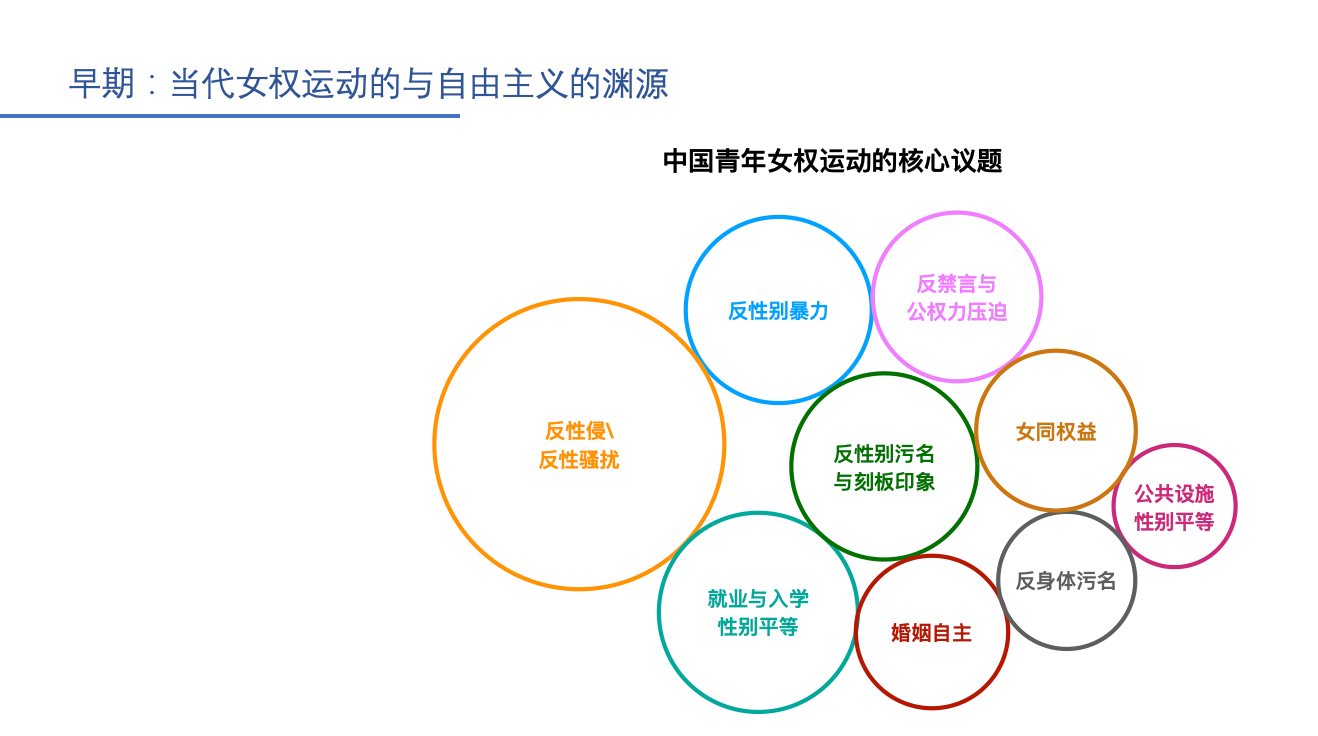
This is an icon I made based on the issues they initiated actions on. The larger the circle on the screen, the more actions they took on this issue. The basis of these issues is closely related to the experience and vital rights of Chinese women. They have a solid realistic foundation, are relatively diverse, and have a good publicity.
Among these actions, the ones that everyone is familiar with may be those cases that have been widely disseminated, such as "Injured Bride Against Domestic Violence" or "Occupy the Men's Toilet" and so on. But this time I want to focus on those actions that are closely linked with civil society. I give three cases:
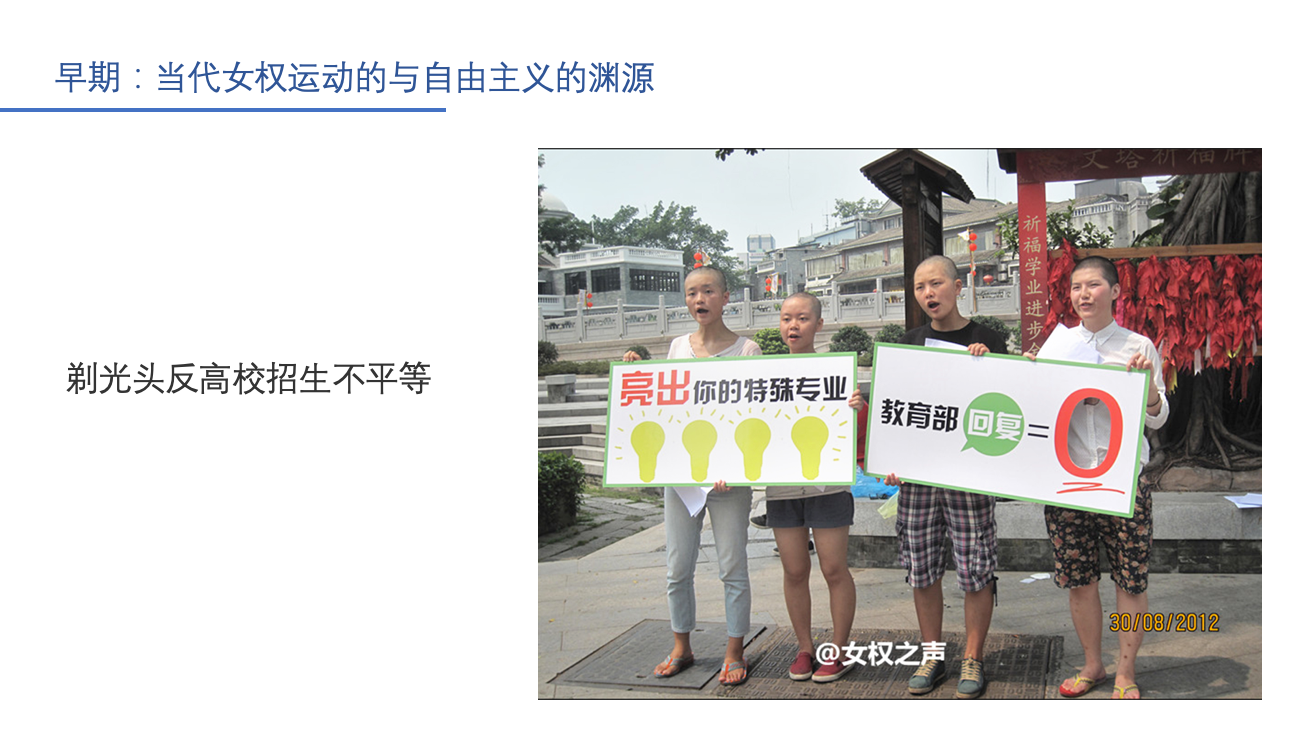
The first is to shave your head against inequality in college admissions. In early July 2012, after the college entrance examination score line was announced, the media found that many colleges and universities had a gender-based scoring line, and the gap between male and female scores was as high as 40 points.
After the report, the issue of gender inequality in college entrance examinations has aroused widespread concern and dissatisfaction in society. At that time, more than 20 lawyers from different provinces issued a joint statement, announcing that female candidates who lost their equal education opportunities due to gender in the college entrance examination would be provided with compulsory legal aid and assist candidates in anti-gender discrimination lawsuits.
Feminist activist Lu Pin and public interest lawyer Huang Yizhi applied to the Ministry of Education for information disclosure, asking which majors the Ministry of Education approves can limit the ratio of male and female students. Later, on August 30, feminist activists publicly shaved their hair under the Guangzhou Wenta Tower, pointing out that the Ministry of Education’s reply was equal to “zero”, and asked the Ministry of Education to “show” which special majors need to improve the admission standards for girls and their in accordance with.
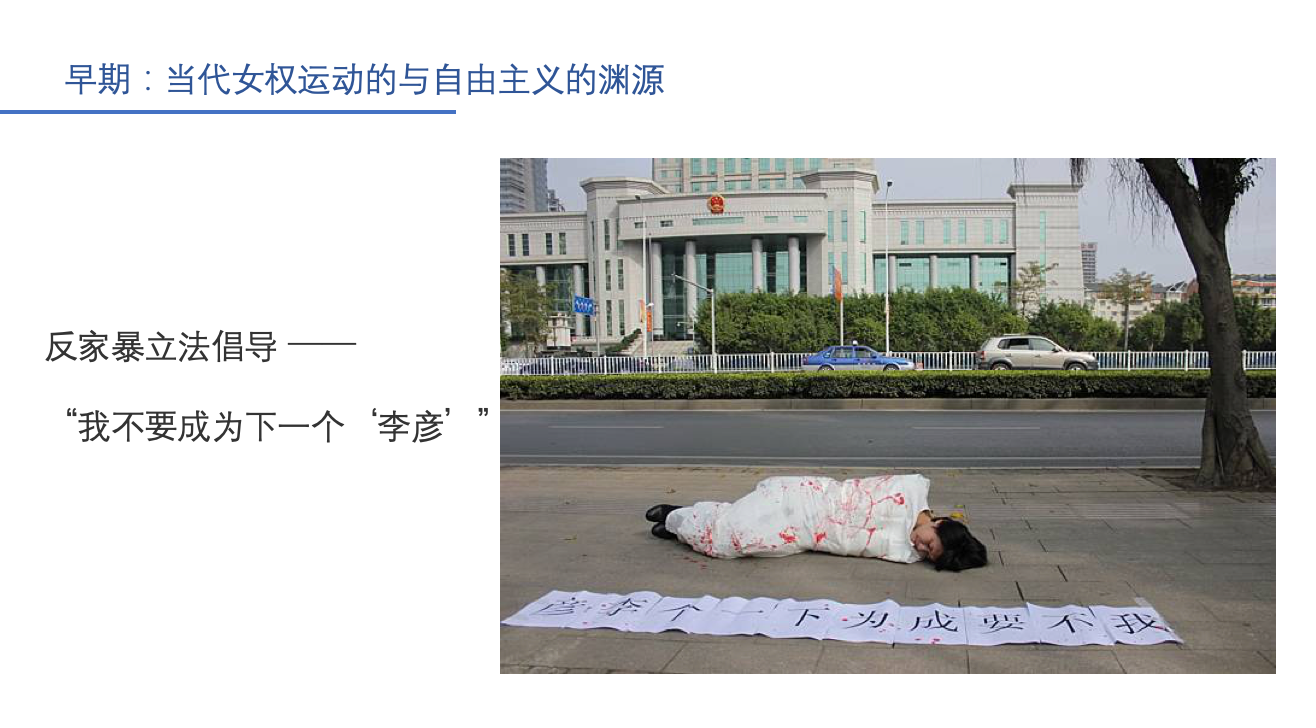
At the end of 2012, the case of Li Yan, a female victim of domestic violence in Sichuan Province, who killed her husband caused controversy after the Supreme People's Court approved Li Yan's death sentence. Since the verdict did not recognize the fact that Li Yan suffered domestic violence for a long time and killed people because of domestic violence, after the verdict came out, more than 400 lawyers, academics, members of NGO organizations, and people from all walks of life came forward to appeal for Li Yan, hoping that the Supreme Court Can keep people under the knife. Feminist activists also staged a "I don't want to be the next Li Yan" public protest outside the courthouse. In the end, the court recognized for the first time that victims of domestic violence can be commuted and sentenced Li Yan to death with a reprieve.
Anti-domestic violence has always been a key issue promoted by feminist activists, and it is also the theme of the most actions, such as their "injured bride" anti-domestic violence, nude photos calling for anti-domestic violence legislation, solidarity with Li Yang's wife Kim's anti-domestic violence activities, etc. etc., together with all sectors of society, promoted the successful implementation of the Anti-Domestic Violence Law at the end of 2015.
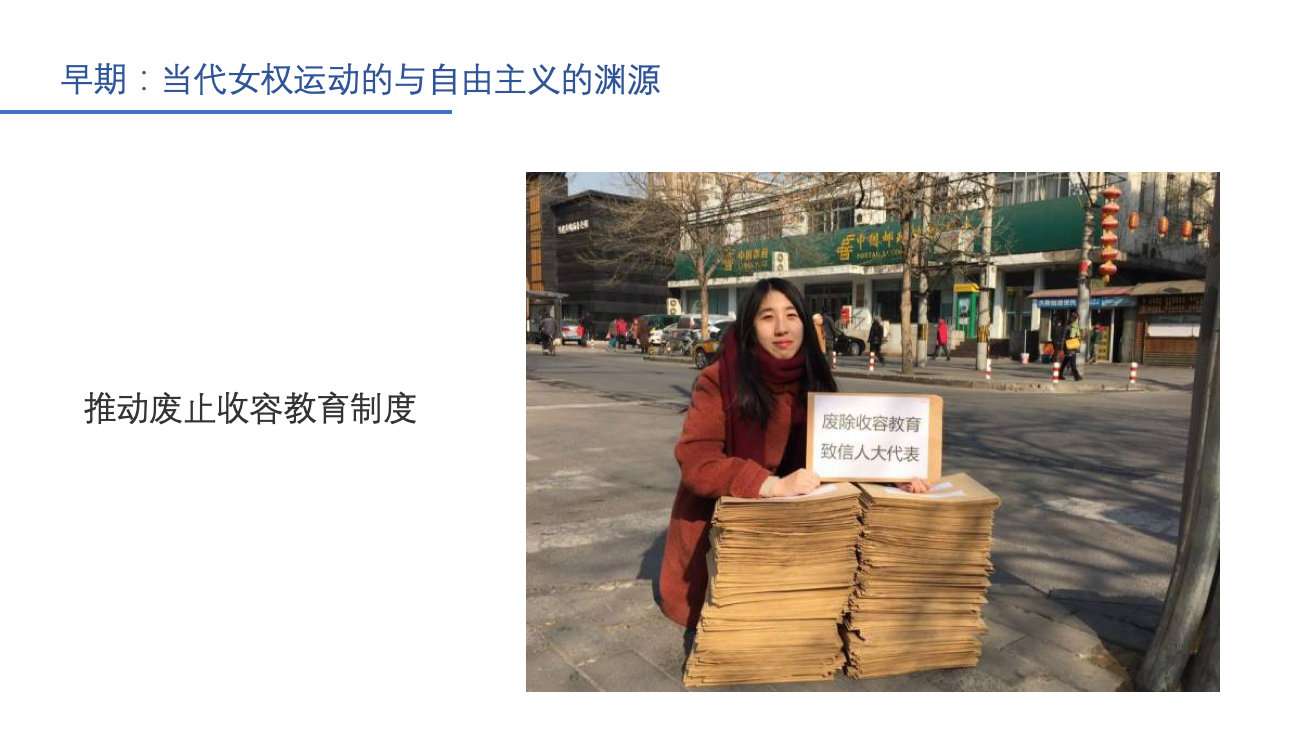
Finally, promoting the abolition of the C&E system is also a relatively successful policy advocacy practice.
Custody and education is an administrative coercive measure specifically aimed at "prostitutes and whores". It stipulates that as long as the law enforcement department makes a ruling, the inmates can be detained for a period ranging from six months to two years without going through legal procedures. So it is illegal in nature, but it has been enforced in China for nearly three decades, and it was not abolished by the National People's Congress until 2019.
This abolition process also depends on the linkage of civil society and the unanimous promotion of people inside and outside the system. In 2014, hundreds of scholars, lawyers, and people from all walks of life, including Zhang Qianfan, signed a petition calling for the Standing Committee of the National People's Congress to abolish the Custody and Education system. And feminist activists have also sent letters to everyone’s representatives for policy advocacy for several years in a row. They have also applied for information disclosure of shelters and initiated a lawsuit against the Guangdong Provincial Public Security Bureau. Although the case was lost, they did not lose the momentum of challenging the judiciary. .
We can see that the social atmosphere at that time was really different from what it is now, and the improved channel still exists. Civil society has a certain space for action, and many actions can also see feedback and results. Many civic groups, including women's rights activists, have also found that the strategy of pushing for change has worked in practice, keeping many optimistic.
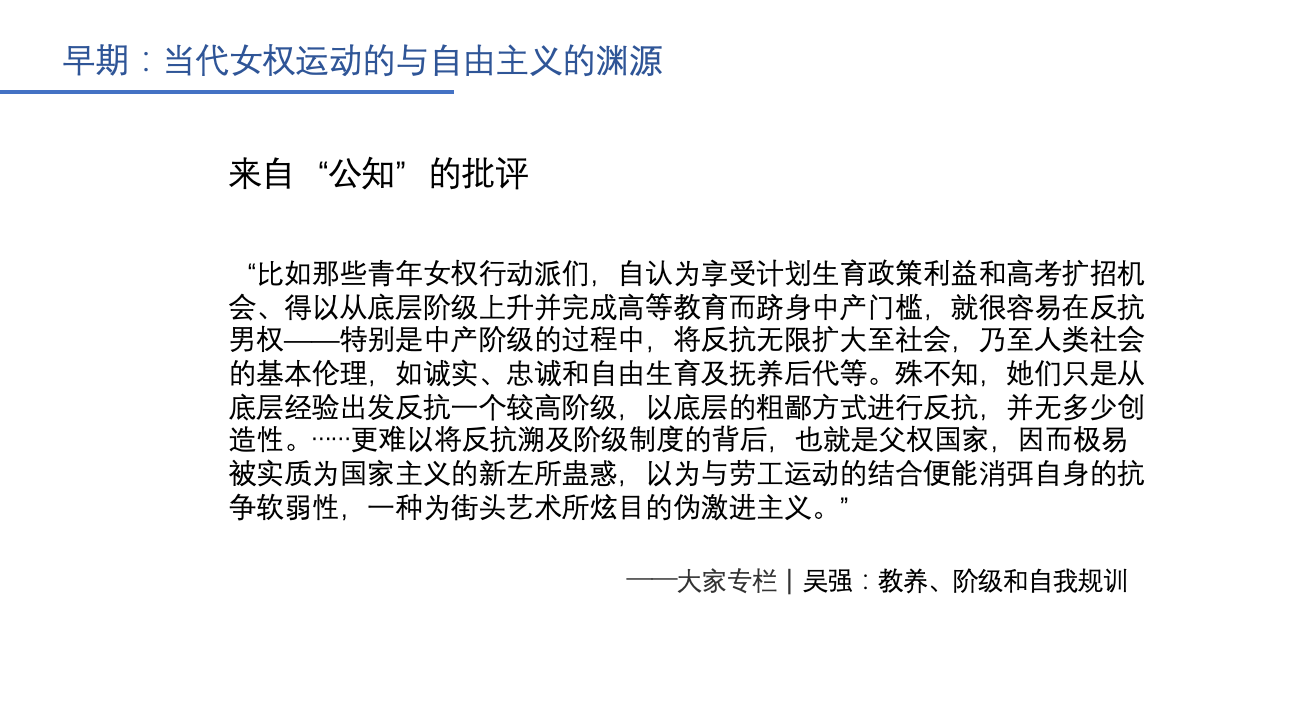
In the face of the rapidly rising feminist activists, there were also some criticisms from "public intellectuals". You can refer to two articles by Bai Xin, one is "Why the Chinese Feminist Movement Is So Close to "Performance Art"". Waterism, partner violence, confusion of values, utilitarianism, disregard of basic ethics, use of patriarchal resources, anti-ethics, anti-society", and in another article " Education, Class and Self-discipline ", starting from the quality of Chinese people, said Feminist activists have no "education", "it is easy to expand the resistance to society, and even the basic ethics of human society, such as honesty, loyalty and freedom to reproduce and raise children in the process of resisting patriarchy, especially the middle class. wait". These two articles aroused the anger of Zhang Hongping, a feminist scholar at the time. She wrote an article "Don't Stigmatize "Feminist Activists": They Represent the Direction of Chinese Women's Rights" to refute these allegations. You can read it for reference.
In general, facing the rise of young feminist groups, some male intellectuals were deeply offended, and even called out big hats like "anti-social and anti-ethical", which just hinted that male intellectuals as vested interests— Both the vested interests of the traditional patriarchy and the vested interests of the emerging market economy - how are they deeply bound to the "ethics" of this society, and have undisguised elite arrogance about their privileges ), and this is exactly what grassroots feminists are willing to resist and challenge.
From the writings of domestic "public intellectuals", we can also see their conceptual framework. Simply put, they are vigilant against the public power at the top and the mediocrity at the bottom, and they are mainly anti-left. Therefore, there is an almost instinctive aversion and alienation towards grassroots, women, social movement participants who are good at mobilizing the masses and demanding equal rights (some people say this is PTSD of the Cultural Revolution). Another term that "public knowledge" often uses to criticize feminism is "incomplete resistance" or "ambiguous relationship with nationalism", so the feminist movement is either said to be in harmony with the system, or it will be harvested by the system. They tend to equate women's or LGBTQ's equal rights (rights) demands with the government's power expansion (power) behavior and resist, which is what we call freedom against equality.
It’s not that their concerns are wrong, but we can understand why domestic liberalism has been unable to connect with today’s young people—the latter can no longer catch up with the train of the era of these privileged people, and would rather go to the left or even nationalism again in their difficulties . In addition, time has also proved that although these feminist activists are not as heroic as those who are most resistant to death in the liberal group, their original intentions have not changed, and they are as clear as yesterday, far from the countless people who sold their souls to power and capital. elites.
Also popular among the liberal group is "there is no human rights yet, so why talk about women's rights?", which has also been criticized a lot. Of course, I accept a question, that is, when we have not yet achieved a relatively formed rule of law and a democratic society, whether the demands of marginalized groups for equal rights can be effectively achieved, or will it "become sour", I will not express it here. You will find that China is in a very complicated state, where pre-modern, modern, and post-modern civilizations and social issues are all mixed together.
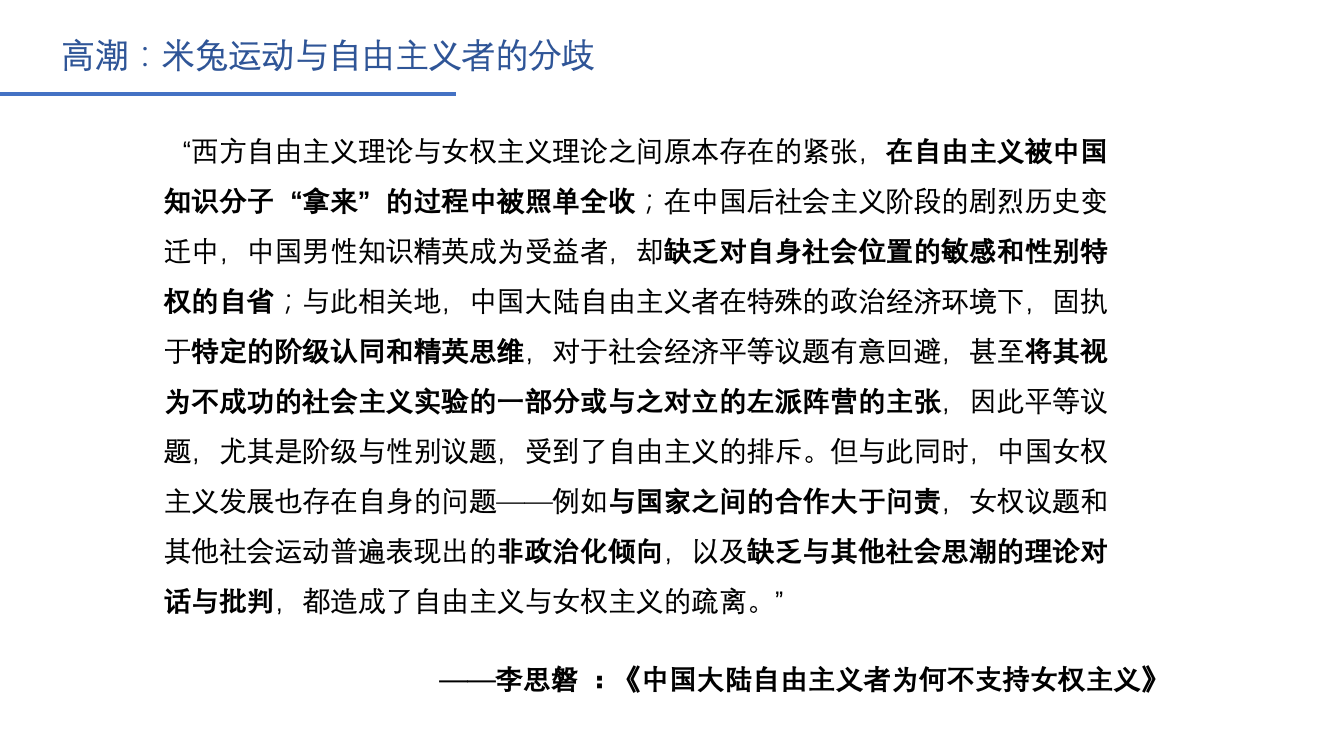
Here I recommend everyone to read Li Sipan’s article “ Why Liberals in Mainland China Don’t Support Feminism ”, and I’ll quote one of her comments: “The original tension between Western liberal theory and feminist theory In the process of liberalism being "brought" by Chinese intellectuals, it was taken as it was; in the dramatic historical changes in China's post-socialist stage, Chinese male intellectual elites became beneficiaries, but they lacked sensitivity to their own social position and gender privileges Correspondingly, under the special political and economic environment, liberals in mainland China are obsessed with certain class identity and elite thinking, deliberately avoiding the issue of social and economic equality, and even regard it as an unsuccessful socialist experiment Equality issues, especially class and gender issues, are rejected by liberalism.
But at the same time, the development of Chinese feminism also has its own problems - such as cooperation with the state rather than accountability, feminist issues and other social movements generally show apolitical tendencies, and lack of theories with other social trends Both dialogue and criticism have resulted in the alienation of liberalism and feminism. "
Interestingly, looking at the development of feminism in China, feminist activists are a group that directly inherits the spirit of liberalism. Compared with the feminists who participated in the founding of the country in the early days and the feminists in the system later, they are the furthest in terms of independence and accountability for public power. This is actually China's liberal feminist movement, but it has almost no support from domestic liberals, which is also very paradoxical. It can only be said that the privileged are not unaware of their privileges, but are very clear about their interests.
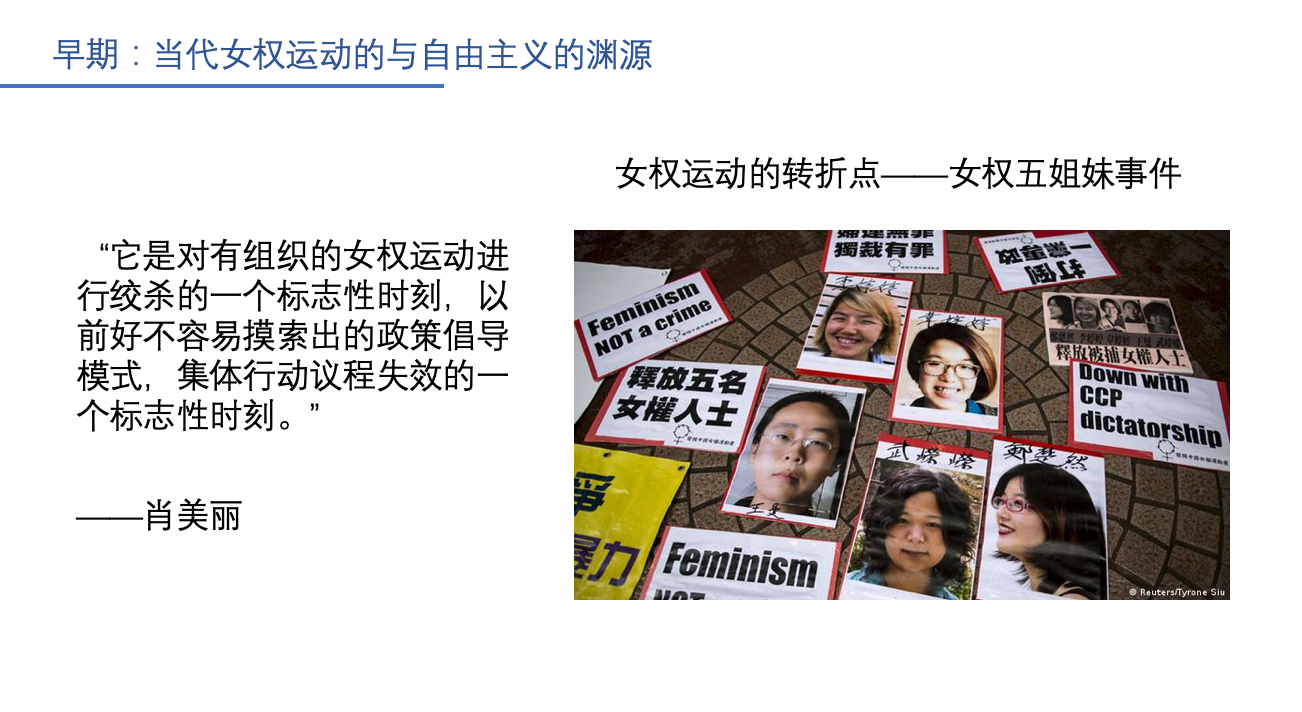
When feminist activists became active, the window period of civil society was actually in the late stage. In 2015, the feminist movement finally ushered in that turning point - the feminist five sisters incident. On the eve of Women’s Day in 2015, five feminist activists, Wang Man, Wei Tingting, Zheng Churan, Li Tingting (Li Maizi), and Wu Rongrong planned to hold public rights protection activities against sexual harassment on buses before March 8th Women’s Day, but they were respectively arrested. The police in Guangzhou, Hangzhou and Beijing arrested him for the crime of "picking quarrels and provoking trouble" and detained him for 37 days.
The arrest of the Five Feminist Sisters in 2015 was also a result of the crackdown on the entire civil society. According to Lu Pin, she felt that the obvious pressure began in 2014, when the government’s harassment increased.
What happened in 2014? The lowest GDP growth in 24 years, Kunming Railway Station, Urumqi Railway Station terrorism, Xinjiang's high-pressure policy, Hong Kong's Occupy Central movement, Dongguan's anti-vice campaign... There is also a wider range of ideological tightening of the Internet, academia, and civil society action.
According to an article in "Terminal Media", in 2012, almost all the suggestions against domestic violence, gender discrimination in the workplace, sexual harassment, and sexual assault were accepted by five or six deputies to the National People's Congress and members of the CPPCC. Raise these issues and make them public through the media. But by 2014, feminist activists found that the number of representatives and committee members who accepted the proposal had not decreased significantly, but they were uniformly unwilling to accept media interviews. Some volunteers boldly asked the reason of the NPC deputies who refused to be interviewed by the media. The other party replied: This year, I received the notice from the above. Unless it is an official media reporter who has registered and runs the line of the two sessions, otherwise I will not accept unregistered media, non-two sessions. Online reporter interview.
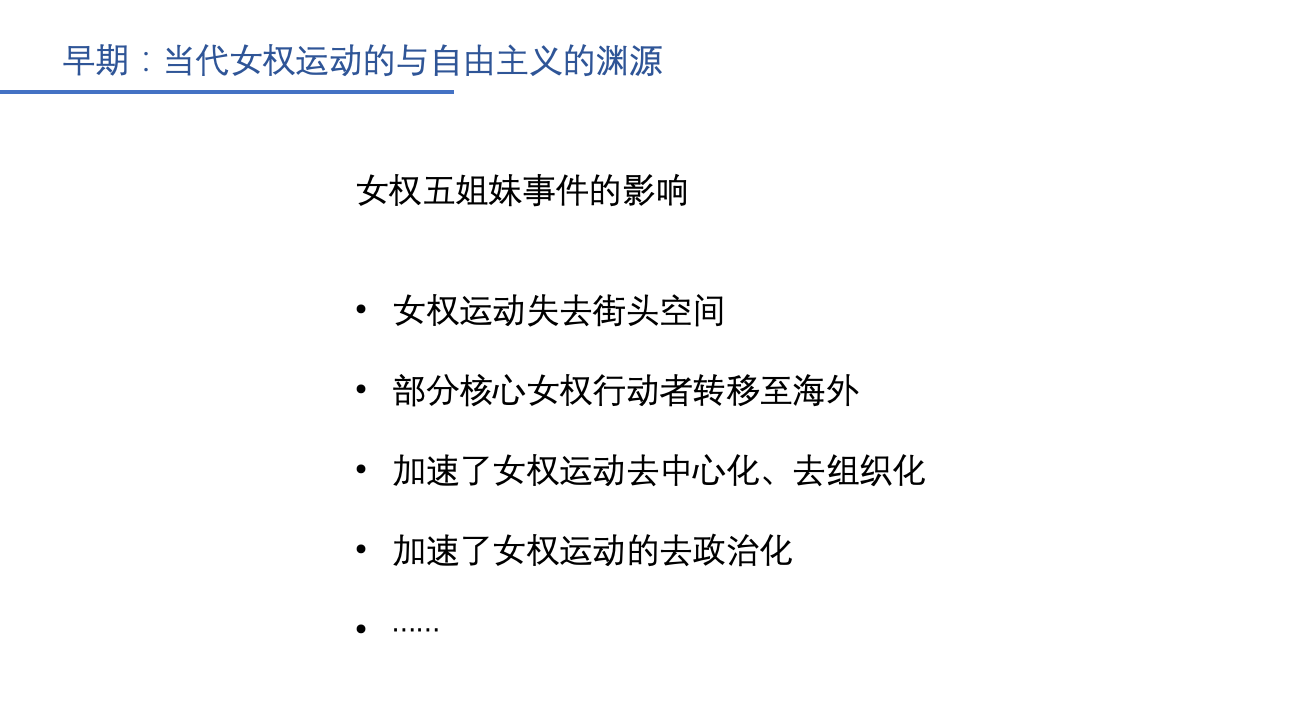
The Feminist Five Sisters incident had a huge impact on the feminist movement, but it did not curb the development of feminism in China. Here I summarize the four impacts of the feminist Five Sisters incident: First, it made the feminist movement lose its street space, and activists can no longer carry out various public protests, advocacy and other activities. Second, with Lu Pin as the main force, some of the core actors who were affected have moved overseas. Third, this hastened the decentralization and disorganization of the feminist movement as core actors were being targeted. Fourth, the feminist movement has finally stepped out of the political safety zone. After touching the red line, it also means that more activities can only be desensitized in a depoliticized way.
Such a trend actually laid the foundation for the Mitu movement to be launched under stricter social control. Because the Mitu movement meets almost all the above characteristics, it happened on social media, it got the participation of many survivors and feminists living overseas, it is a decentralized social movement, and it blasts individuals rather than directly to the system.
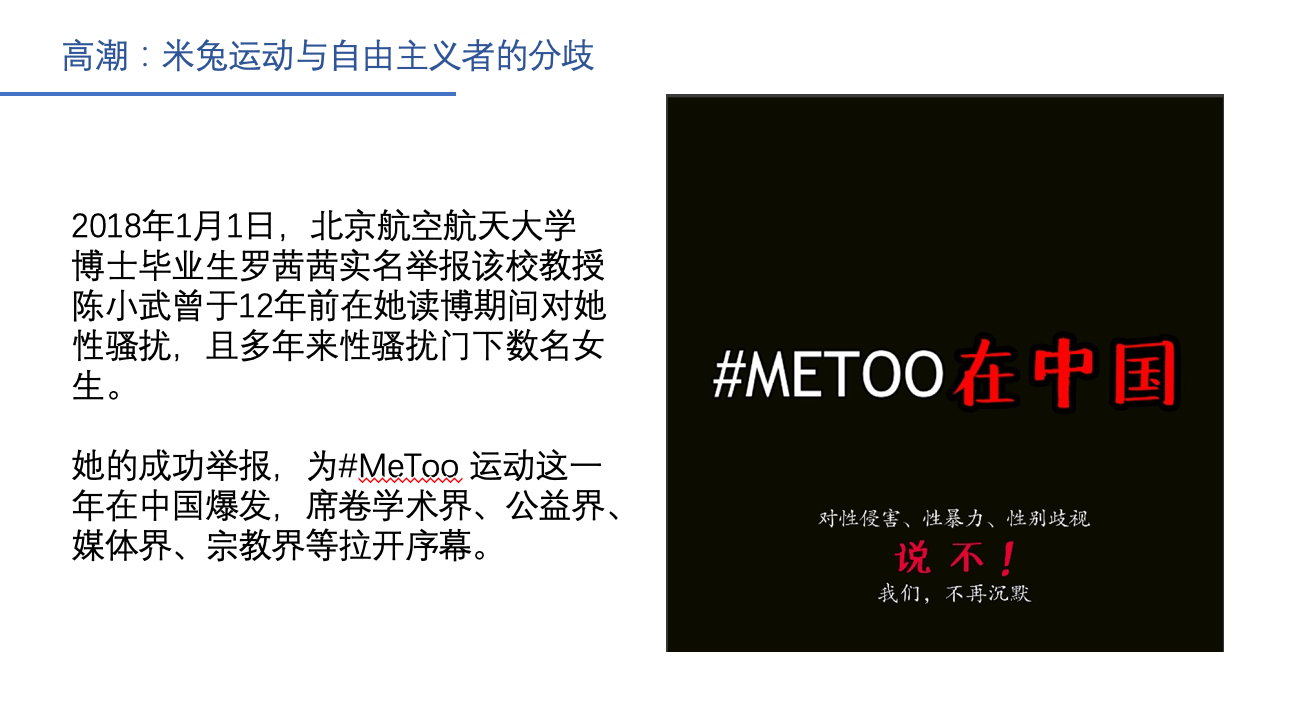
On January 1, 2018, Luo Xixi, a former Ph.D. graduate of Beihang University, reported in her real name, accusing the school’s professor Chen Xiaowu of sexually harassing her 12 years ago while she was studying for a Ph.D. Later, Beijing University of Aeronautics and Astronautics issued a notice revoking Chen Xiaowu's position as executive vice president of the Graduate School, disqualifying him as a graduate tutor, revoking his position as a teacher, and disqualifying him as a teacher. Afterwards, the Ministry of Education announced the revocation of Chen Xiaowu's title of "Cheung Kong Scholar".
Her successful report kicked off the outbreak of the #MeToo movement in China this year. As more and more people came forward, the movement quickly swept across the academic, public welfare, media, and religious circles...
Feminist activists quickly followed suit. In the following week or so after Chen Xiaowu was reported, dozens of alumni from universities in China issued joint open letters asking their alma maters to establish mechanisms to prevent sexual harassment on campus, including Peking University, Tsinghua University, Fudan University, Shanghai Jiaotong University, Wuhan University, Well-known universities such as Sun Yat-sen University.
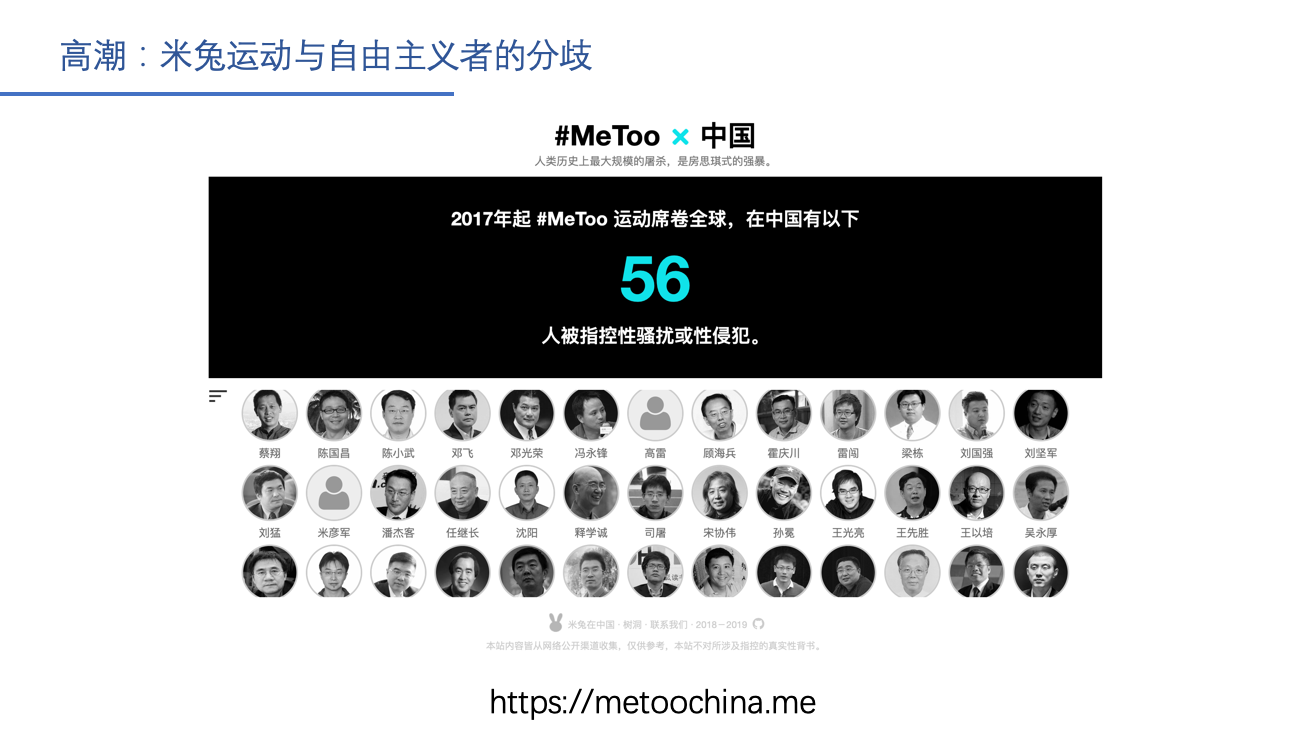
Some folk volunteers made this website and recorded 56 people who were exposed to sexual harassment/sexual assault during the Mitu Movement, many of whom are quite well-known in their professional fields: Deng Fei, Lei Chuang, Liu Meng, Huo Qingchuan , Zhang Wen, Shen Yang, Wang Guangliang, Shi Xuecheng...
There was a public cross-examination between some of them and the whistleblower, so there was a lot of discussion online. It is worth mentioning that the outbreak of Mitu in these circles is not because the phenomenon of abuse of women in these circles is "particularly" serious, but because these circles are relatively progressive, the power structure is relatively flat, there are more elite women, and women have a voice can get more support. The "inside the system", which is difficult for Mitu to break into, is relatively a black box.
But let's take a look at these circles: university scholars, public welfare practitioners, media people, these are the places where public knowledge gathers. So in terms of perception, the feminist community at that time was already very angry with the public intellectuals, that is to say, all of you were sanctimonious, full of democracy, freedom, rationality and enlightenment, but when you faced women, you still relied on your own power to exploit and violate them. The other party still engages in the fraternity system of protecting and defending each other, so what is the difference between you and the power you despise? ——Feminists have a lot of criticisms and complaints like this, so during the Mitu movement, for us, the liberal group revealed a very large hypocrisy, contradiction and ethical crisis.
I remember that there was a saying in the pan-freedom circle at that time: Mitu was diverting people's attention from the vaccine issue (because it happened not long after Changchun Changsheng's vaccine ignited public opinion). In the eyes of many liberals, women's issues have never had subjectivity, and they will always be a tool for power struggles, or a pawn in a big chess game. You will find that this problem has always been accompanied by gender issues - that is, turning a blind eye to gender issues.
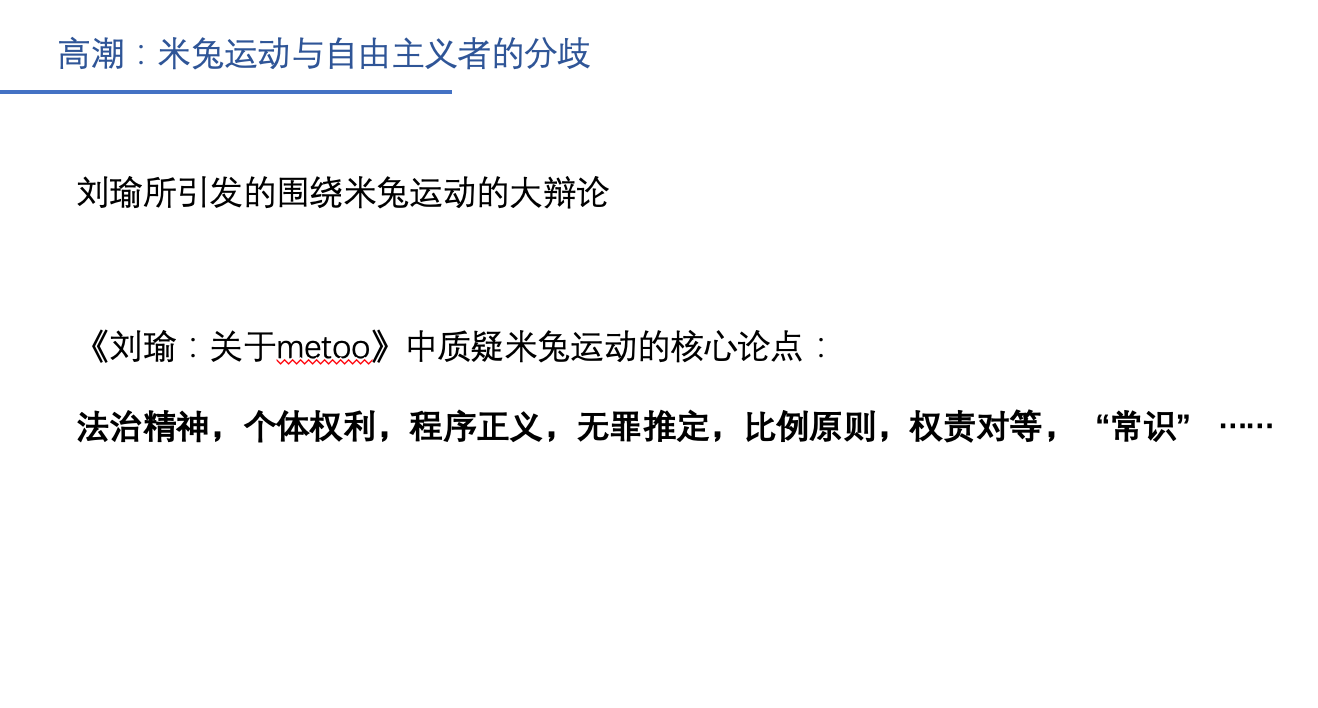
Therefore, in such a context, Liu Yu wrote an article "Liu Yu: About metoo" questioning the Mitu movement, which properly added fuel to the fire and immediately sparked a debate in the feminist community against public intellectuals. I suggest that you re-read this article. Liu Yu questioned all the reasons for the Mitu movement, such as the spirit of the rule of law, individual rights, presumption of innocence, procedural justice, proportionality, reciprocity of rights and responsibilities, "common sense" and so on. Chen Chun said: They are the ideas of liberal intellectuals, and they are also the "water level of ideas" in China at this stage. Liu Yu is not ahead, but he is not behind either. So after she posted it, she got the support of many liberals, but this article triggered a fierce attack from the feminist community (or the progressive liberal community). Critics argue that the older generation of “intellectuals,” elites who have been in the ivory tower for too long, have lagged far behind younger activists who lack reflection on their own gender and class dividends, and have difficulty noticing inequality The role of the power structure on ordinary women, thus losing empathy for vulnerable women, ignoring the fact that the existing system cannot solve and respond to the violations suffered by women.
Looking at Liu Yu's opinion calmly now, I still think she is sincere. She asked some sincere questions. I believe that many onlookers have similar questions about Mitu. The Mi Rabbit debate is an important discussion. It is the first time that feminism has collided openly with another trend of thought. Without this discussion, many of our concepts may not be so deeply rooted in the hearts of the people. But it is a pity that Liu Yu compared the Mitu Movement to a big-character poster at the beginning of the article. This analogy to the Cultural Revolution is enough to trigger the stress response of any Chinese. Feminists crucified Liu Yu after they refuted this claim, and as for the issues she raised, no one gave any thought to whether they deserved serious scrutiny. The result is that after the debate, the problems that Mitu and the feminist movement need to face are still here.
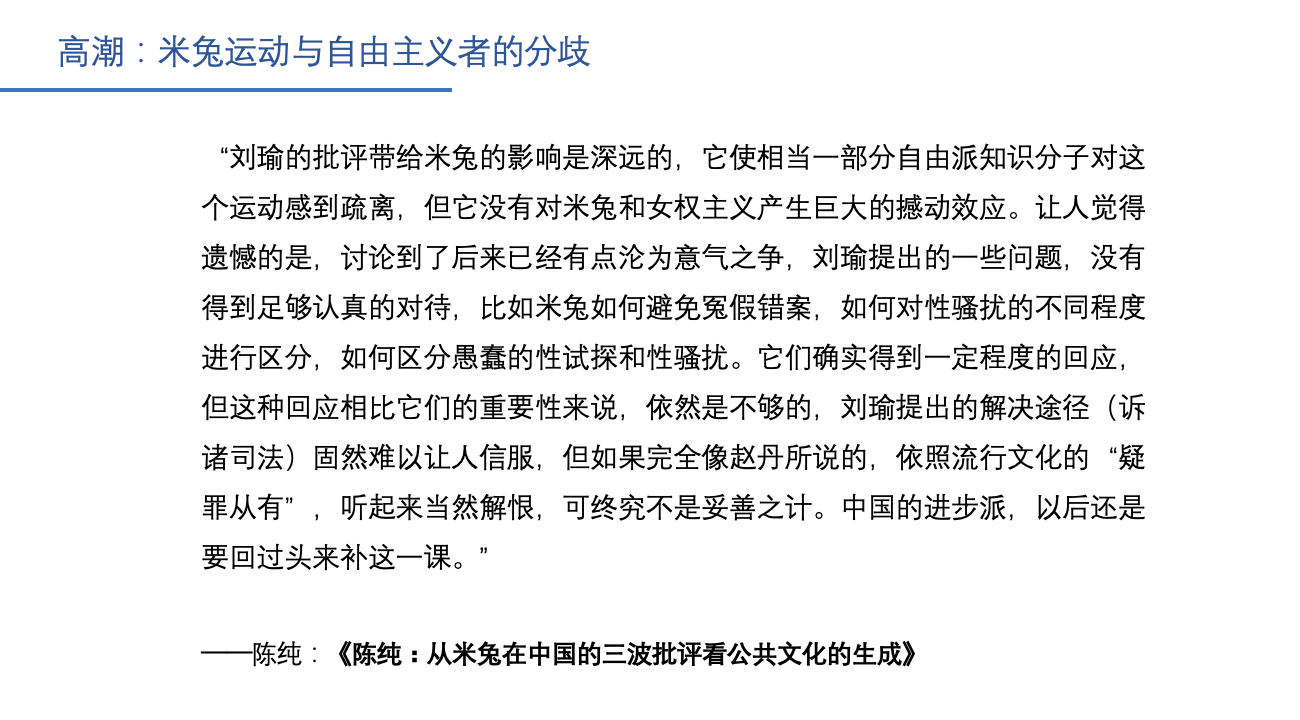
I agree with Chen Chun's opinion in his article "The Formation of Public Culture from Mitu's Three Waves of Criticism in China" : "Liu Yu's criticism has had a profound impact on Mitu, and it has made a considerable number of liberal intellectuals I feel alienated from this movement, but it did not have a huge shaking effect on Mitu and feminism. It is a pity that the discussion has become a bit of a dispute, and some of the issues raised by Liu Yu have not been taken seriously enough For example, how Mitu avoids unjust, false and wrongly decided cases, how to distinguish between different degrees of sexual harassment, and how to distinguish between stupid sexual temptation and sexual harassment. They do get a certain degree of response, but this response is compared to their importance , is still not enough. The solution proposed by Liu Yu (recourse to justice) is certainly not convincing, but if it is exactly as Zhao Dan said, according to the pop culture "suspicious crime", it sounds of course to relieve hatred, but After all, it is not a good solution. China’s progressives will still have to go back and make up for this lesson in the future.”
I think that the feminist community does not exist outside the filter of the same elite "progressive liberals", and we also have many problems. As for how to face the development of women's rights after Mitu, progressive liberals also have to take off their own filters, see the reality of the Chinese feminist movement, and reopen the discussion.
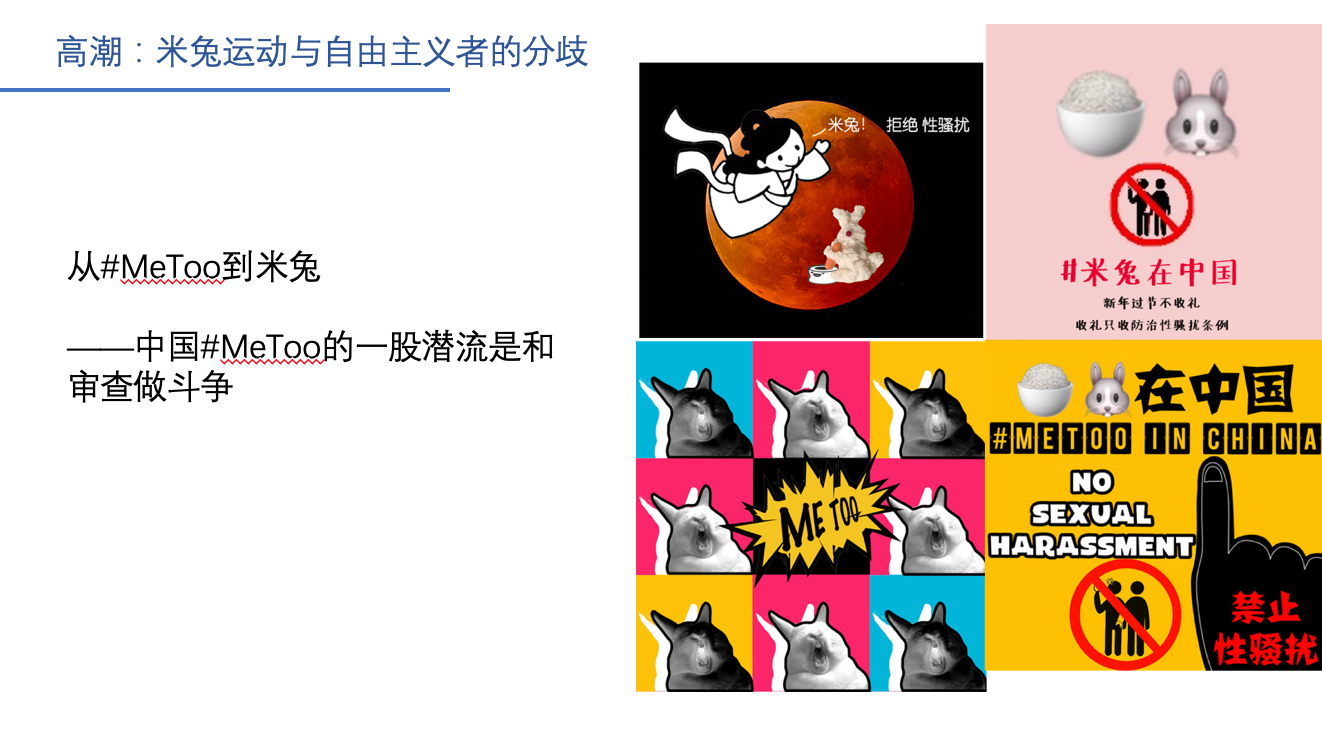
At that time, the discussion about Mitu did not continue because the Mitu movement encountered a stronger third-party force, that is, censorship. In fact, Mitu has been under censorship, and there are always restrictions and deleted posts. But after Xianzi exposed Zhu Jun, the Mitu movement was more comprehensively deleted and suppressed. In the opinion of activist Xiao Meili, the reason why Mitu broke out in such a harsh environment in 2018 is more difficult to contain than other rights protection activities, because of Mitu’s continuous individual blasting methods—you don’t know One is who will stand up, so the official stability maintenance mechanism is difficult to work, which has allowed Mitu to survive for so long.
The name Mitu was also used to avoid censorship. The original Metoo became a homophonic "Mitu". Feminist activists initiated many creations about this rabbit and maintained its spread on social media.
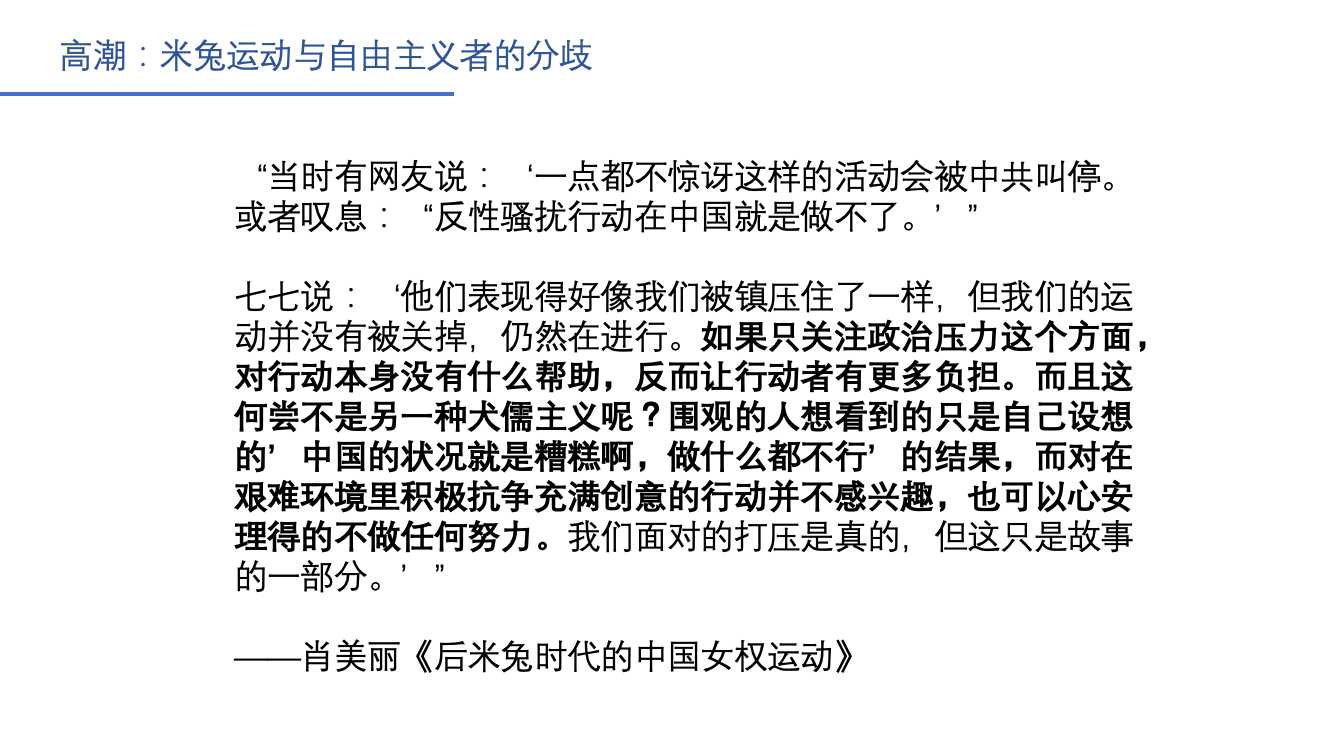
At that time, some netizens said: "I am not surprised that such an activity will be stopped by the CCP." Or sighed: "Anti-sexual harassment campaigns simply cannot be done in China."
Qiqi, one of our activists, said: "They acted as if we were suppressed, but our movement was not shut down, it was still going on. If you only focus on the aspect of political pressure, it will not help the movement itself. , but puts more burdens on the activists. And isn’t this another kind of cynicism? What the onlookers want to see is the result of their own imagination, “China’s situation is terrible, and nothing can be done.” There is no interest in aggressively fighting creative actions in difficult circumstances, and one can be content not to make any effort. The oppression we face is real, but it’s only part of the story.”
We can see that activism is the source of the spirit and strength of feminist activists, and it is also a key to understanding this wave of feminist movement. A popular saying among activists is: "Only action is the only antidote to despair and emptiness." It is precisely because of the empowerment of pragmatic and strategic activism that feminist activists will continue to grow stronger. Keep fighting under pressure. But this kind of pragmatism is sometimes interpreted as successful by some people. I think liberals like to look at everything from the perspective of a grand narrative, which tends to make a person small and cynical, and dispels the individual's initiative and motivation to fight.
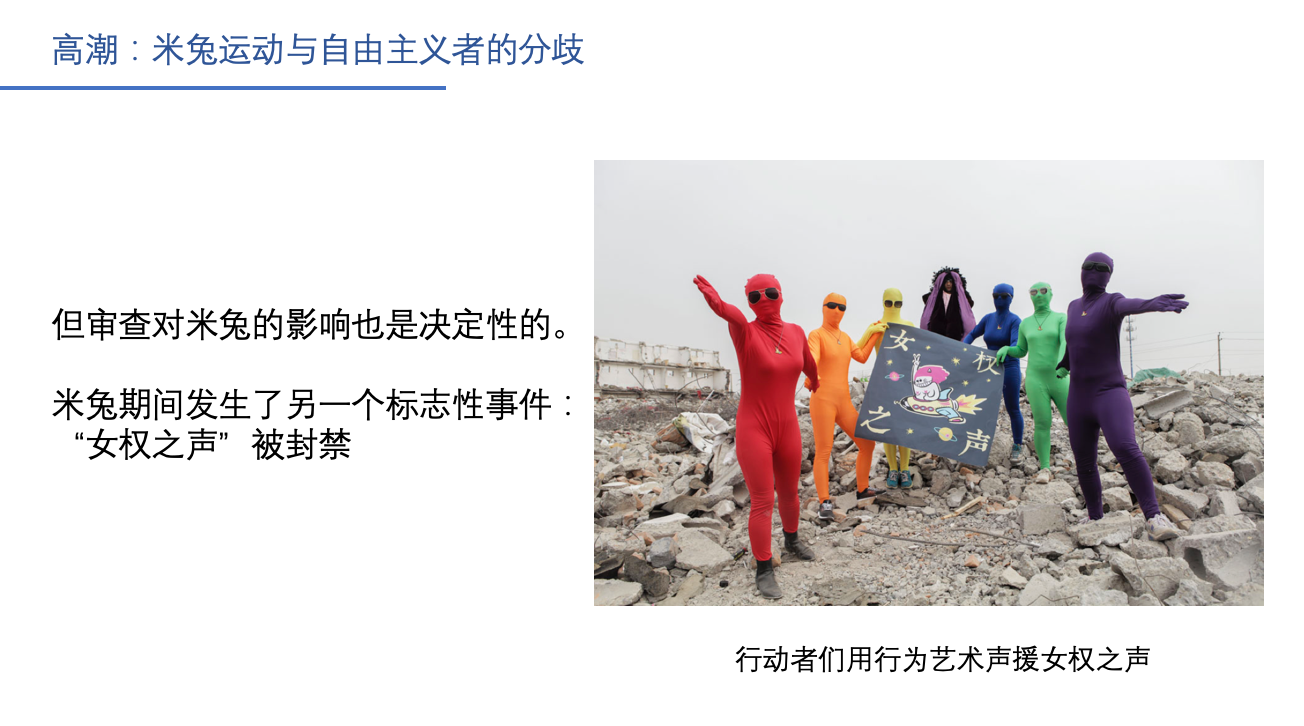
But we must admit that the impact of censorship on Mitu is also decisive. During the Mitu movement, another landmark event that may have been overlooked occurred, that is, on March 9, 2018, Feminist Voice was banned from the entire Internet. As I said above, the Young Feminist Activists and Feminist Voices are complementary. One is a local action organization, and the other is a communication and publicity platform. So after the Five Feminist Sisters incident, until Feminist Voices was completely blocked, the Activist Feminist Movement, it can be said that their path was almost blocked by the authorities.
In order to get back the account, the staff of Feminist Voices has also gone through a long period of rights protection, including our feminists overseas who have also done solidarity actions. They sent a letter to the Central Cyberspace Administration of China, and applied to multiple departments in Beijing and Guangdong for information disclosure. Later, they filed a lawsuit against Weibo and WeChat, but neither filed a case nor responded.
(Later, the "Voice of Women's Rights" was reincarnated as "Echo", repeatedly experienced bans, but still insisted on staying in the field of public opinion to speak out.)
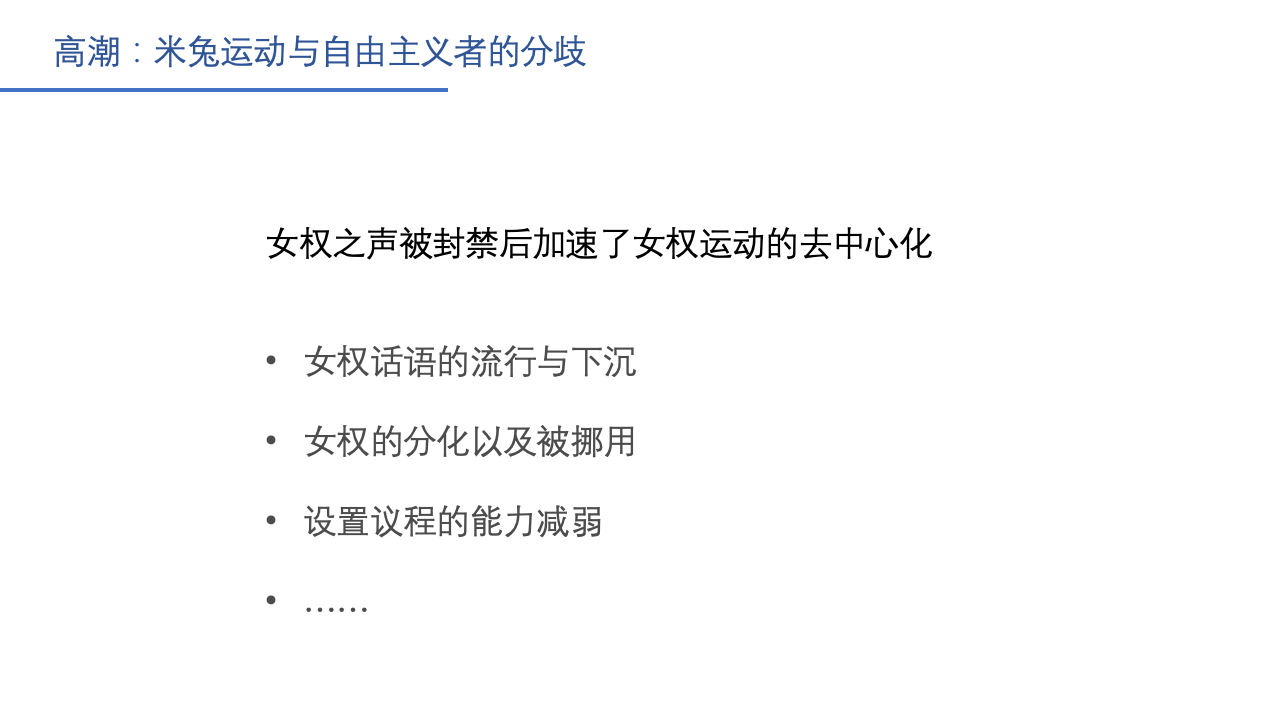
After Feminist Voices was banned, it also accelerated the decentralization of the feminist movement. Of course, the background of decentralization is that the authorities have been trying their best to destroy organized citizen groups for a long time. But there are also technical factors, that is, the feminist movement has become a movement based on social media in the later period, and the characteristics and limitations of social media itself are also shaping this movement.
Feminist discourse continues to flow and sink on social media. Due to the structure of Weibo netizens, the influx of young (female) users has brought feminist ideas to more audiences, emotional mobilization on the Internet has become easier and easier, and the popularity of pan-feminist discourse on social media has radiated more people. , when gender issues arise, there is basically no need for any core organization to form a broad voice.
The second is the differentiation and misappropriation of women's rights. Various creative factions have emerged in feminism, and there is no relatively consistent feminist thought and agenda in the pan-feminist community. On the contrary, the concepts among feminists may be tit-for-tat. For example, the faction that has always called itself "radical feminism" has a contemptuous attitude towards the so-called "equal rights faction". The point of view is that women are the primary sex, and the current unfavorable situation of women is caused by usurped reproductive rights. Therefore, we want to regain our own reproductive rights, and the way to achieve this is to oppose marriage and procreation. Those who hold this view believe that if every woman wakes up and no longer chooses to have children in a patriarchal marriage, male oppression of women will be broken down and society will be rebuilt into a female-centered structure. This kind of thinking starts with the reproductive issues that most women have to face, and it is easy to arouse women's empathy. Because it is simple and easy to do, and avoids class differences, it caters to the preferences of the urban middle class.
In addition, after the start of the traffic economy era, Weibo is full of Internet celebrities and marketing accounts, and feminism is often misappropriated by marketing to attract female users with spending power. For example, SK-II's popular "Leftover Women" advertisement has aroused our vigilance about women's rights being exploited by consumerism. I think this kind of misappropriation distorts the original intention of feminism—that is, public affairs to fight for the rights of disadvantaged women, and packages feminism as a consumer product for elites and middle-class women and a way to practice self-worth; self-improvement, independence, beauty, Successful female images have become the endorsement of feminism, thus imposing a higher standard of "good woman" on women. Of course, it does not mean that this direction is not considered "feminism". Emphasizing individual empowerment is also a part of feminism. It is just to understand what kind of feminism is liked by this system and maintain a critical perspective on it.

Finally, decentralization reduces the ability of feminists to set an agenda. For example, after an incident breaks out, how should we define the issues related to it, and who should we hold accountable? How did this matter end up being resolved? These all need to set the agenda. But you will find that on social media, after losing the "backbone" with sufficient appeal, the topic is easy to be "biased", and the public often loses focus. For example, after the Mitu movement sank enough, it was interpreted by some people as a movement to "condemn scumbags".
Plus, our agenda is often hijacked by state media. The People’s Daily once published an article saying that schools should listen to students’ voices in the Gaoyan incident at Peking University during the Mitu movement; it also published an article “Different fireworks can bloom the same” after the announcement on Weibo’s “cleaning up homosexual content” Support for gay and bisexuality. The Global Times also questioned the Wushan government's handling of the Wushan child bride case, and called on the "higher-level government" to intervene for the victims. But none of this affects the reality that Peking University students were interviewed and suppressed, LGBTQ activities were suspended, and Wushan Tong’s daughter-in-law Ma Panyan was kept quiet and her mouth was covered.
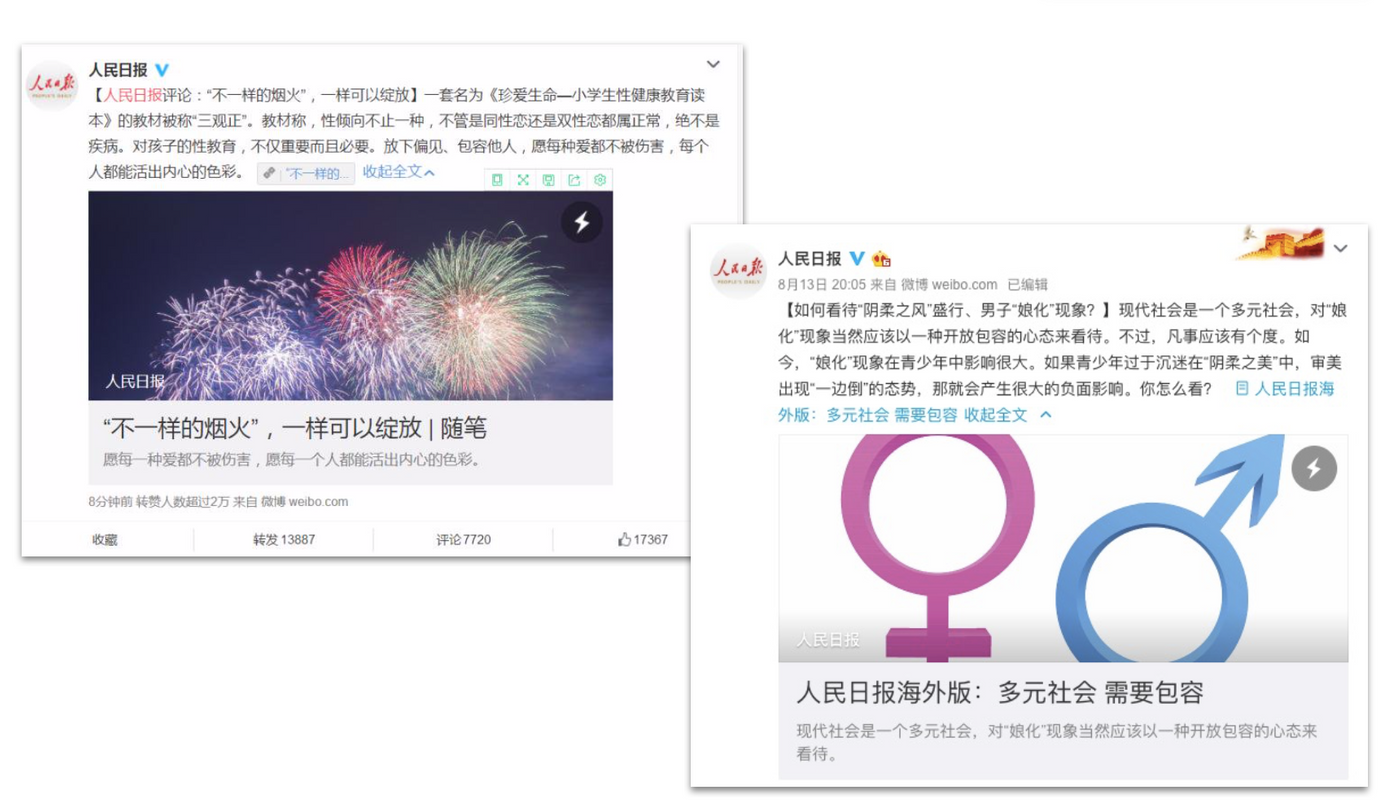
It is worth adding that the state media not only hijacks the feminist agenda, but has even been trying to hijack feminism and hijack the right to interpret women's rights. For example, the Central Committee of the Communist Youth League has repeatedly posted on Weibo to criticize "pastoral feminism" and "extreme feminism", and tried to define what real feminism is. In fact, the powerful will not distinguish what is idyllic and extreme. He says it is you. For example, he says that feminist activists are extreme women's rights.
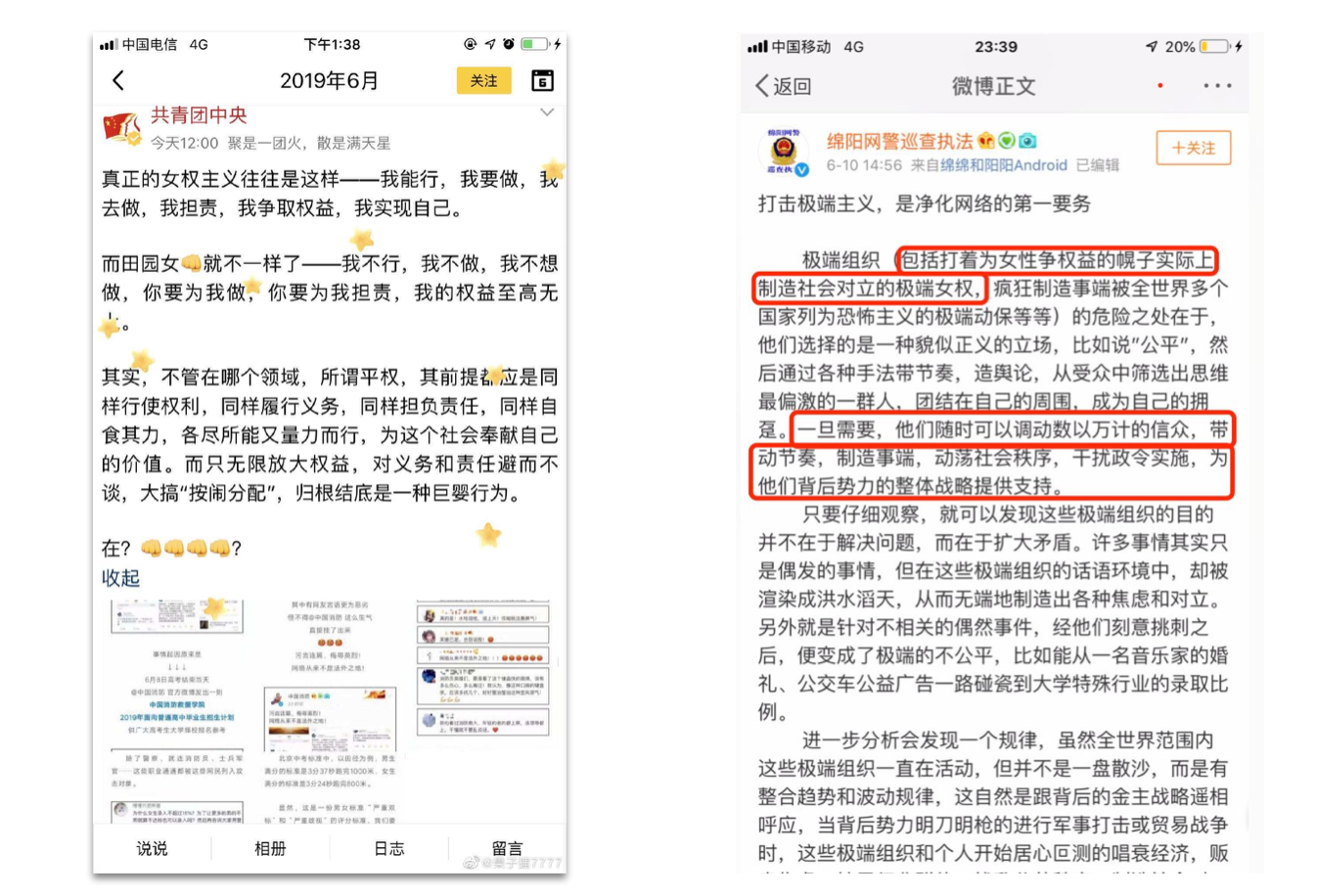
All of the above are accompanied by the trend of decreasing legitimacy and increasing stigma of feminism. We have seen that there are both environmental factors and our own factors. We should analyze how some of our own changes are caused by the squeezed environment. the result of. After the political legitimacy of women’s rights to eliminate gender-exploitative relations has been weakened, they have been besieged by forces inside and outside the system. In addition to official suppression, voices stigmatizing women’s rights are also increasing, such as “feminist rights support Muslims”, “feminist rights Stories such as "organizing prostitution", "women's rights colluding with Western forces", "feminism against the party and the regime" emerge in endlessly. One article you can refer to is "A Brief History of Weibo's Anti-feminism" written by Lu Pin.
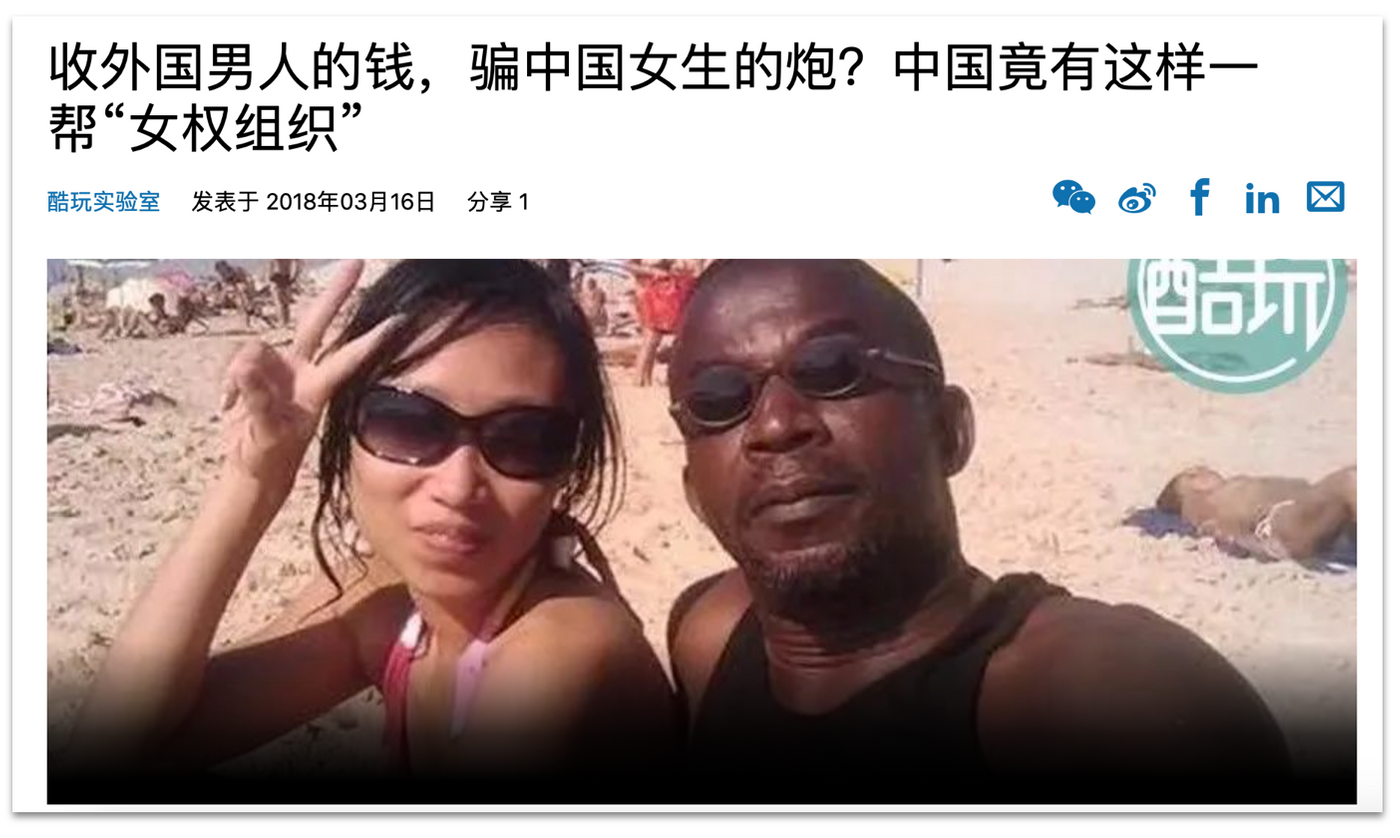
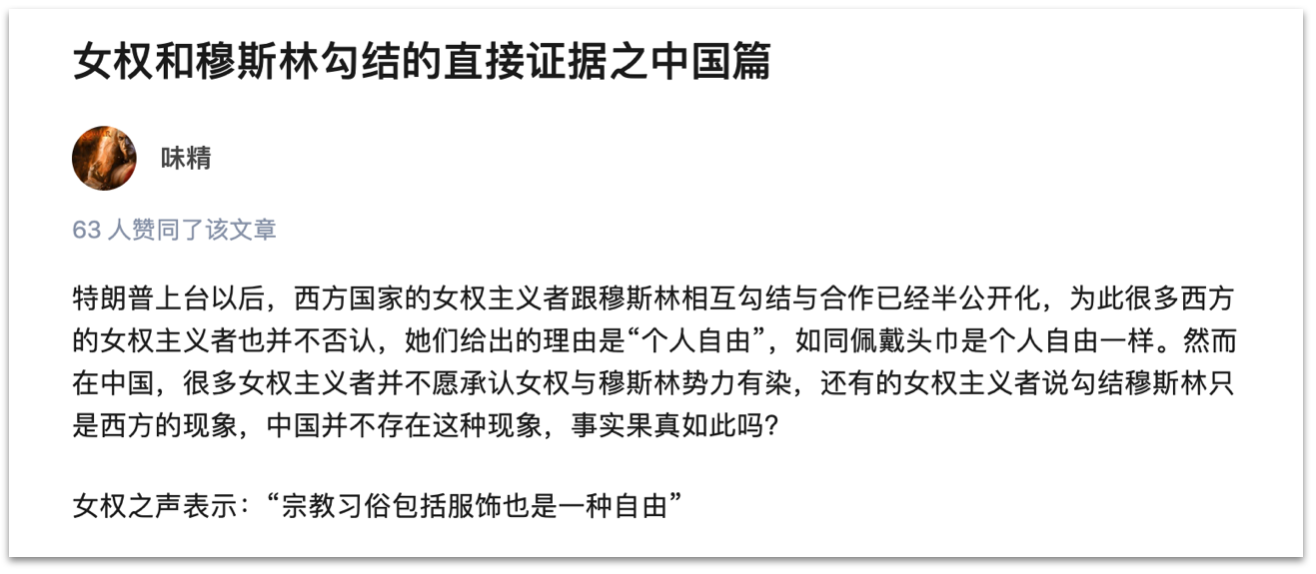
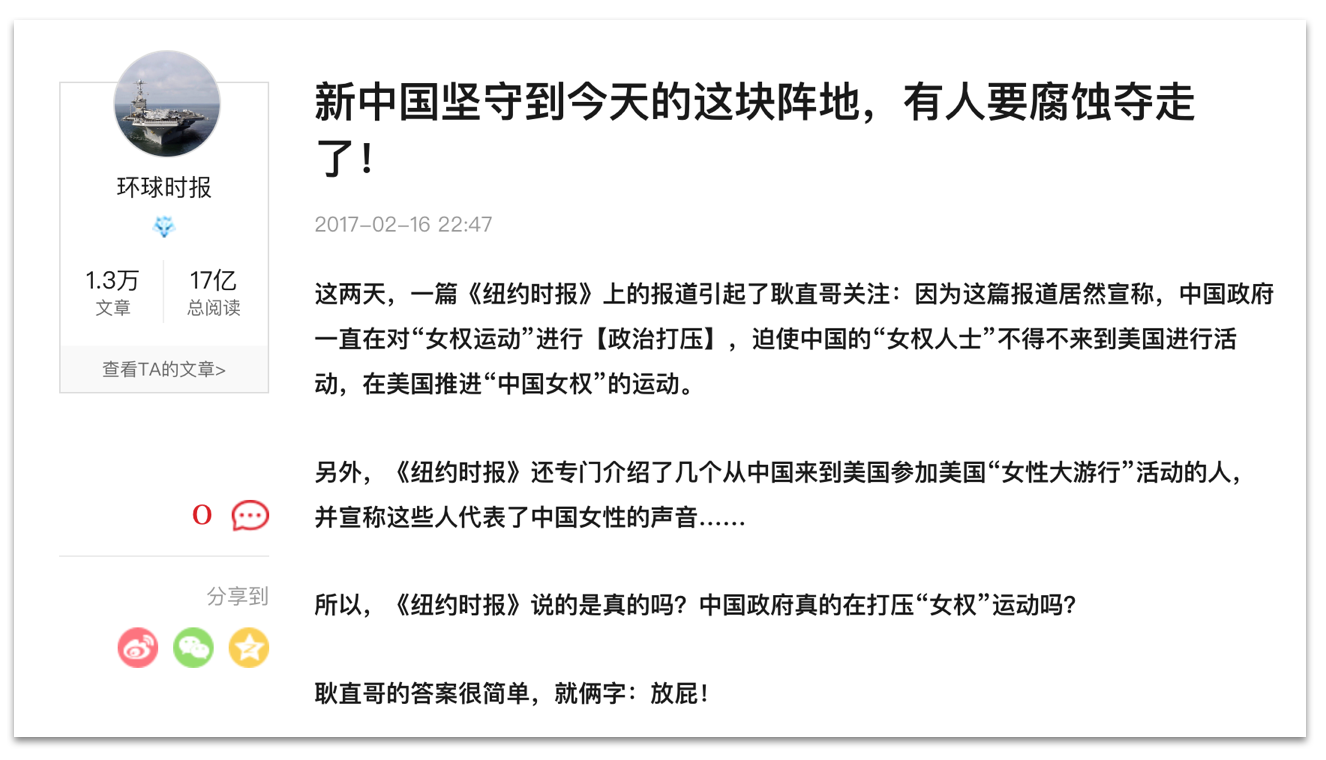
Despite the siege, the Mitu movement still had a great impact on the development of the feminist movement. In the case of Liu Qiangdong, we launched the #我也不是维权者者# campaign on social media to popularize knowledge about "rape culture" and call on a large number of female users to share their experiences of sexual harassment and assault in their daily lives. These women, in their own language, publicly narrate the daily abused experiences that have never been discussed in the public space and have never been paid attention to by public opinion, and have formed public knowledge. Their stories strive to clarify the stigmatization of victims in the patriarchal society, and correct the public's blind spots and prejudices about sexual harassment and sexual assault, so as to resist the power mechanism that creates humiliation. "The perpetrator is often an ordinary acquaintance around you" and "rejecting the theory that the victim is guilty" are familiar common sense, which has spread to public opinion in this way.
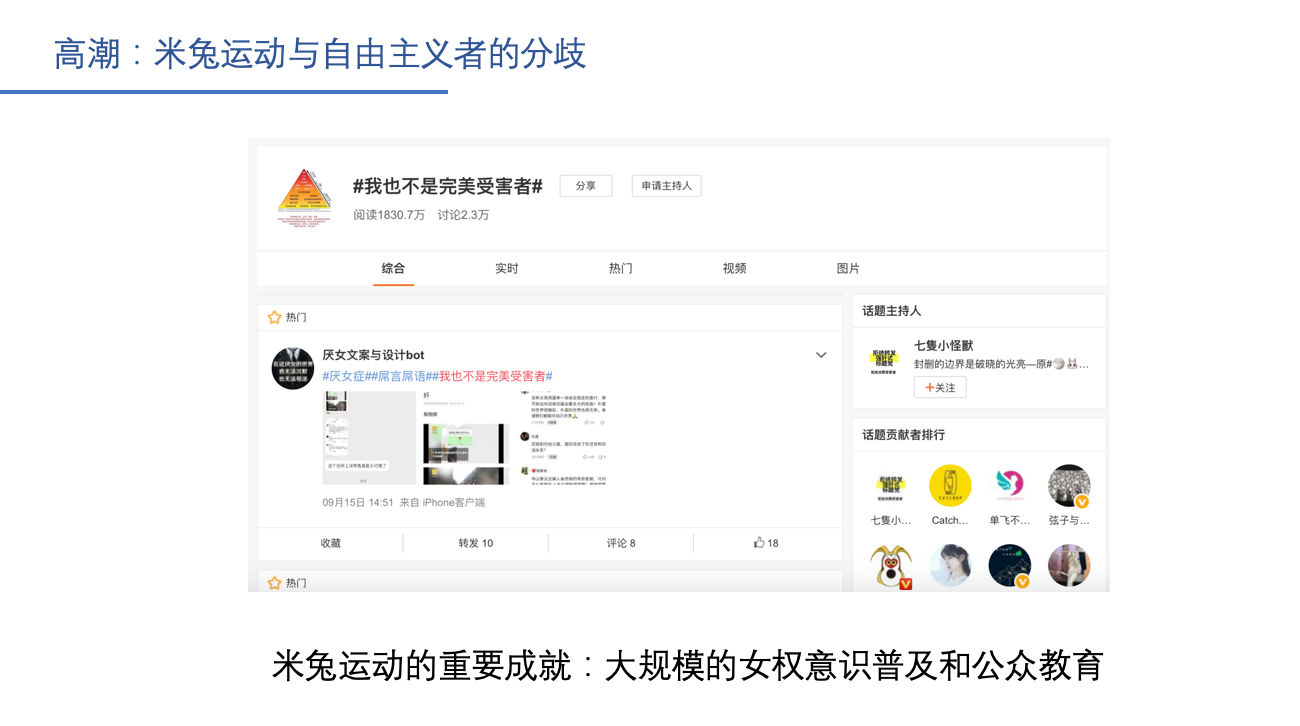
Here I would like to excerpt an interpretation of the Mitu movement by Xianzi, the party involved in the Zhu Jun case:
"In fact, Mitu is a speech movement. It encourages girls to speak out about their experiences, and prevents us from handing over the power of judging this experience to others, whether it is to the police who tell you not to call the police, or to the police who refuse to admit it. Men who are the truth should leave it to those who humiliate their victims as sluts. When did women start to express their own physical experiences? Many women have this consensus... There are more young men, men who have empathy for women, they realize the dignity of the weak, and the dignity of our most basic body needs to be seen.
We didn’t have the right to judge our own experience before, because you didn’t get knowledge, and the experience of all women was not included in an overall trend, so your own experience of being hurt is just your own experience of being hurt. But I think starting from Mitu (it’s different)... As long as we are willing to do our own writing, this is a kind of spiritual independence, independent of men, independent of the collective composed of men, you write your own stories. All our value judgments have to be reconstructed within our own narratives. "
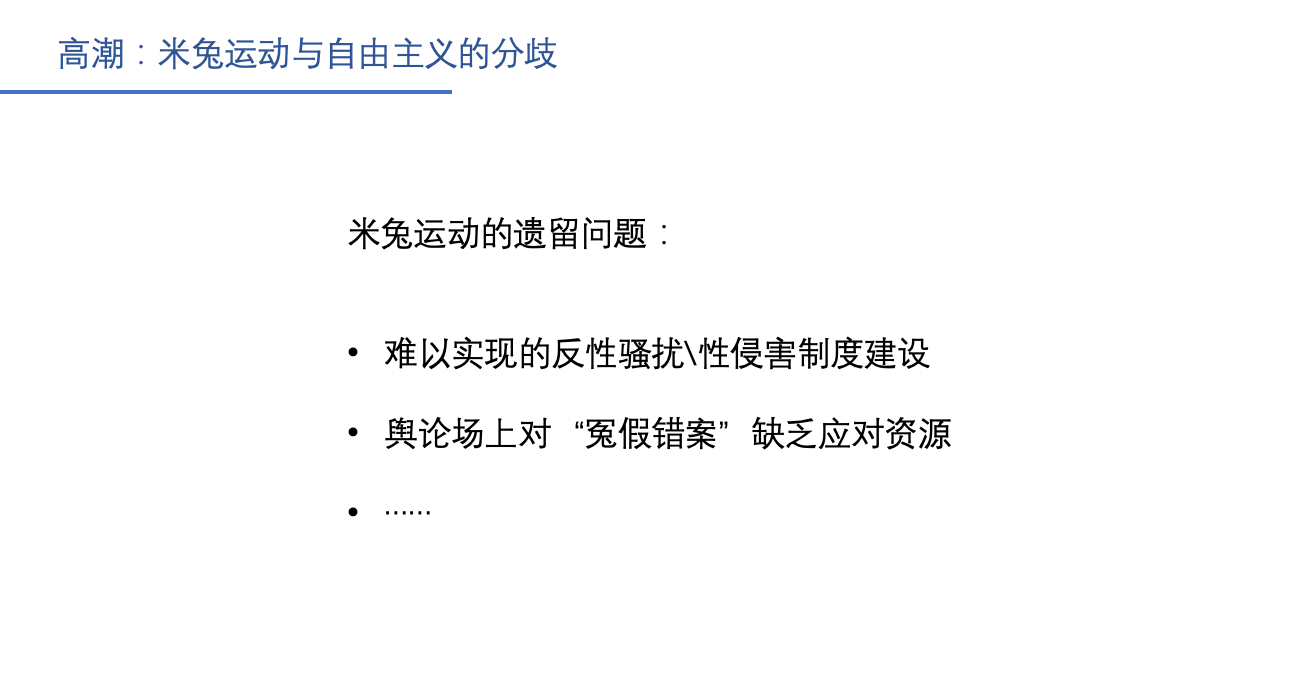
However, Mitu still has some remaining problems. During the campaign, it was difficult for feminist activists to promote the construction of a system to prevent sexual assault in major universities, organizations or institutions. And even if some systems are formed, under the existing social culture and power structure, it is difficult to guarantee their effective implementation. At the end of 2019, seven departments including the Ministry of Education issued the "Opinions on Strengthening and Improving the Construction of Teachers' Morality and Morality in the New Era", which mentioned "zero tolerance" for very few teachers who sexually harass students and other behaviors that violate students' physical and mental health. However, it turned the power structure issue that the Mitu movement was held accountable into an issue of "teacher ethics", and turned a social issue of gender inequality into a problem of some people's "moral corruption", making Mitu The enormous energy of the movement was lost.
In addition, in the field of public opinion, the Mitu case in the post-Mitu era has also encountered more controversy. For example, the Tsinghua senior sister case and the Luo Guanjun case have caused the legitimacy of Mitu to be fiercely attacked. Among the critics are not only anti-feminist populists grouped together, but also liberals who hold a "reasonable and neutral" stance. Feminists lacked the resources to respond to "unjust, false and wrongly decided cases" and fell into a passive defense. It was also because feminists did not reflect thoroughly during the Mitu debate aroused by Liu Yu (there was no urgency for reflection at the time. ). I have analyzed this issue in "From the "Tsinghua Senior Sister" Incident to the Dilemma of Feminist Public Opinion" : When the Mitu Movement has achieved its influence, we may have to be prepared to see more "unjust, false and wrongly decided cases". Because the Mi Rabbit campaign has lowered the threshold and cost for whistleblowers, those who stand up will gain more public attention and support. Compared with the general sexual harassment and sexual assault incidents, the "unjust, false and wrongly decided cases" that appeared at this time are easier to be discovered and disseminated, and become a carnival for anti-feminists. But in the final analysis, a decentralized social movement itself cannot always be pure and correct, and negative news must be part of it.
Therefore, when the Mitu Movement has difficulty finding a realistic way to promote institutional improvements, and can only be trapped in the public opinion field, fighting public opinion wars on individual cases, the boundary between it and cyberbullying becomes blurred. up.
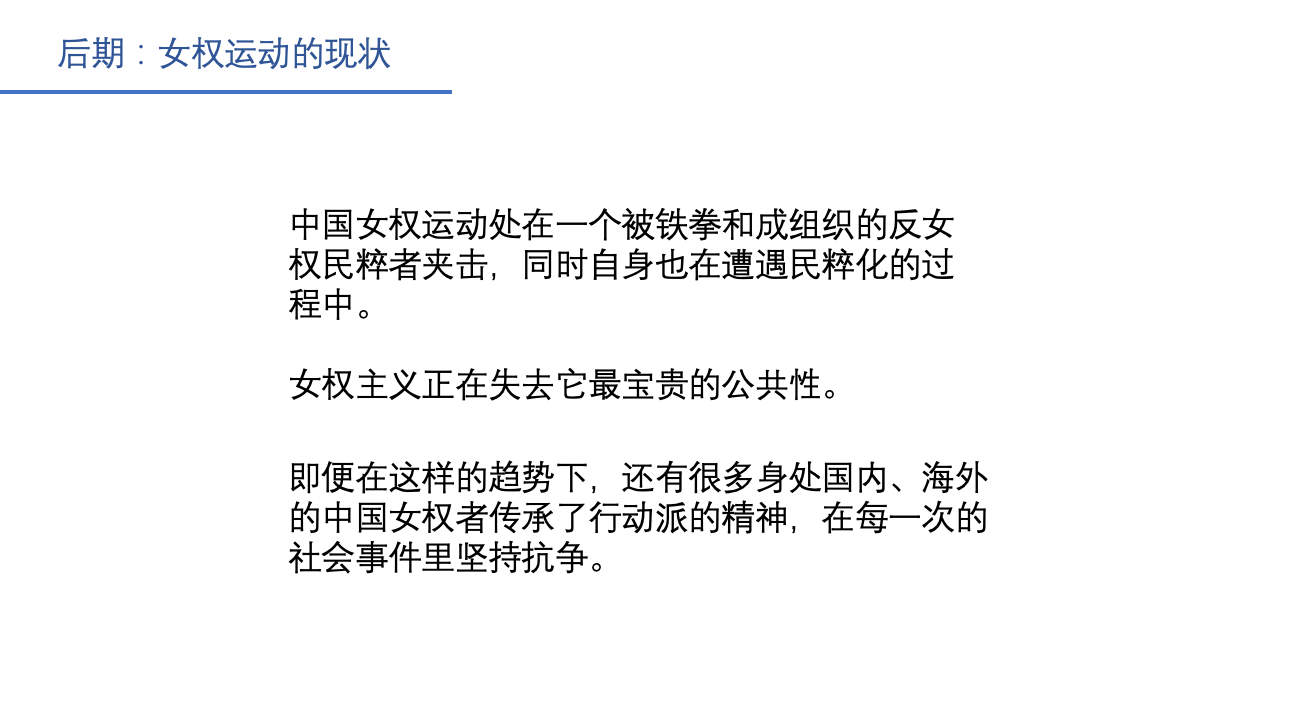
The Mitu movement has greatly promoted feminism and made women's rights more populist. Feminist ideas, theories, and discourse have sunk to form a broad pan-feminist community. But the characteristic of a sinking ideology is that it is difficult to maintain the original appearance at the source, but it will combine elements that have been accumulated for a long time in popular culture, so as to get closer to the original appearance of this soil.
When the soil is conservative, single, narcissistic, socially developed, utilitarian, anti-intellectual, partisan, lacks public spirit, and has strong gender norms, there is no way for feminists to automatically oppose them because of "feminism". Immunity to these toxins. Many discourses and ideas under the banner of feminism are actually anti-feminism, the mirror image of patriarchy in the feminist version, and the part of our community that has been corrupted and swallowed by this system, such as the praise of "violence to violence", Worship of state authority, discrimination against the poor (especially poor men), and hostility to the LGBTQ+ group; for example, some elite women who occupy class advantages use feminism as a tool to expand their power; some feminists impose more (such as the "womb morality" that was invented to promote female eugenics), and some even showed strong misogyny tendencies--attacks on "married women" and women who choose to have children, and "do not leave the perpetrator "The attacks of victims of domestic violence and so on.
It’s not that populism is necessarily bad, or that social movements have to regulate development in the way that the most virtuous feminists expect. A social movement may have many participants and many aspects, as Yugi said in the article "Metoo and the Perfect Social Movement Myth" : "The movement's openness, cooperation, moderation, and improvement can be compared with closure, conflict, and violence. , coexist with radical elements, and the imperfection of the latter is often the unique feature of social movements.” Moreover, unlike social movements in Europe and the United States, local feminist movements are still being suppressed by such severe public power development. Because of this, I don't think Mitu and the feminist movement should hide their problems.
What I personally feel most regrettable is that feminism is losing its most precious publicity in such a state where it is surrounded by iron fists and organized anti-feminist populists, and at the same time it is also undergoing the process of populism itself. It has moved away from the civic movement’s grand vision of taking action for the rights of all women and changing the country and even the world, and has become a gender war within the framework of identity politics, and the comfort zone of feminists embracing themselves .
But what I also want to say is that even under such a trend, there are still many Chinese feminists at home and abroad who inherit the blood of the activists and persist in fighting in every social incident. As a member of the overseas community, I have witnessed and participated in some core actors organizing the feminist community from scratch, organizing discussions and solidarity activities on domestic public events, and also participating in such events as Black Lives Matter, Stop Asian Hate and other important social movements in the United States, to raise the voice of Chinese feminists, and to broaden the spectrum of resistance of overseas Chinese.
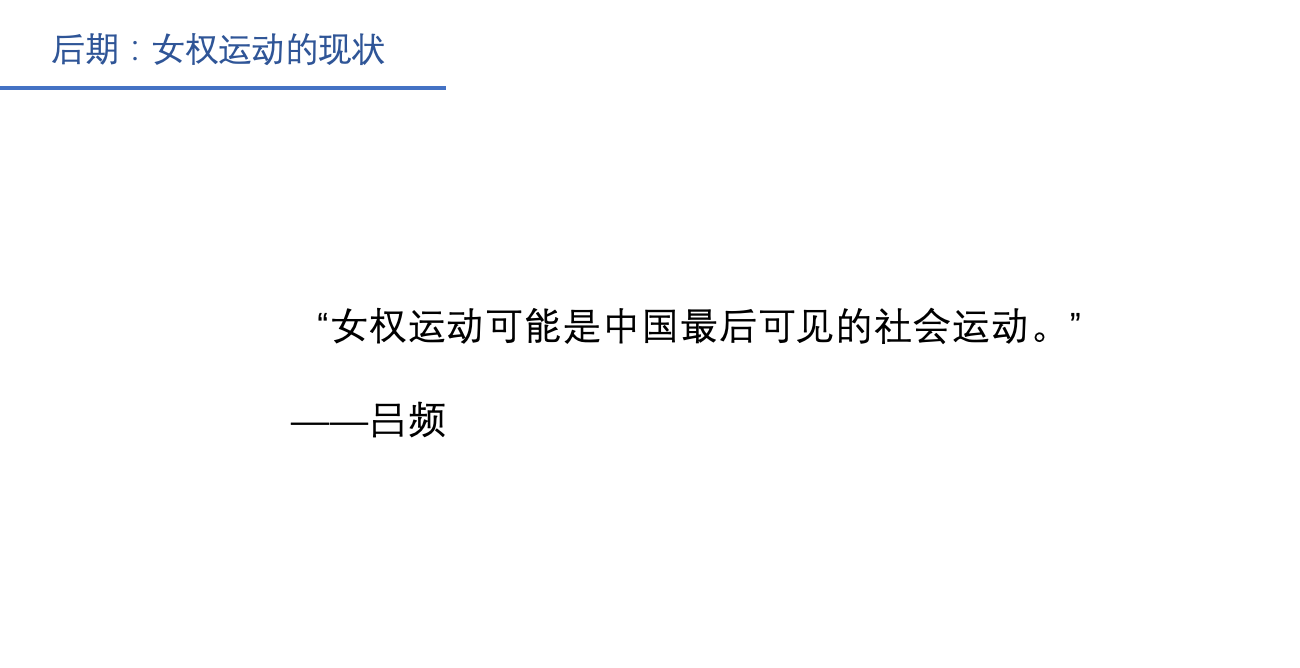
Lu Pin once said: "The feminist movement may be the last visible social movement in China." I think it may be more accurate to say "the last civil society movement", because I don't know whether there will be a storm completely caused by populism in the future. But the words sparked a sense of urgency and responsibility in me.
After domestic liberal activists were suppressed, feminists were hit again and again with an iron fist. They were already on the verge of struggling, but few people who cared about China knew about the feminist rights of the younger generation. The history of the resistance of the activists. Today, the entire civil society is fragmented, and our memory is broken, so it is difficult to see and learn from each other. Therefore, rather than perpetuating the stereotypes of the past, it is more important to reimagine what the relationship between liberalism and the feminist movement should be.
I believe that everyone can see through my sharing that neither feminism nor liberalism is without shortcomings and limitations, nor is it uncriticizable. It can even be said that our legitimacy is based on limitations. Complementing and learning from each other becomes particularly important. Not only the "failure" of liberalism, but now feminism has also internalized the poison of totalitarianism. To cut off this chain of violence, we must go against violence. This means how we will interact in a non-violent way in the future . I think critics and reflectors within the community are very important, and it is also important to develop ideas across ideologies and multiple perspectives. Such people will become bridges. Because I believe that the meaning of freedom is being improved and expanded by different people all the time, and liberalism is becoming more and more inclusive.
I also believe that in a place far from fear, the liberal community concerned about the fate of Chinese civil society and feminists will be able to reconnect.
thank you all.
Like my work? Don't forget to support and clap, let me know that you are with me on the road of creation. Keep this enthusiasm together!






